-p.gers
wolves, hounds and other герои*:
dreaming of chechnya
*heroes
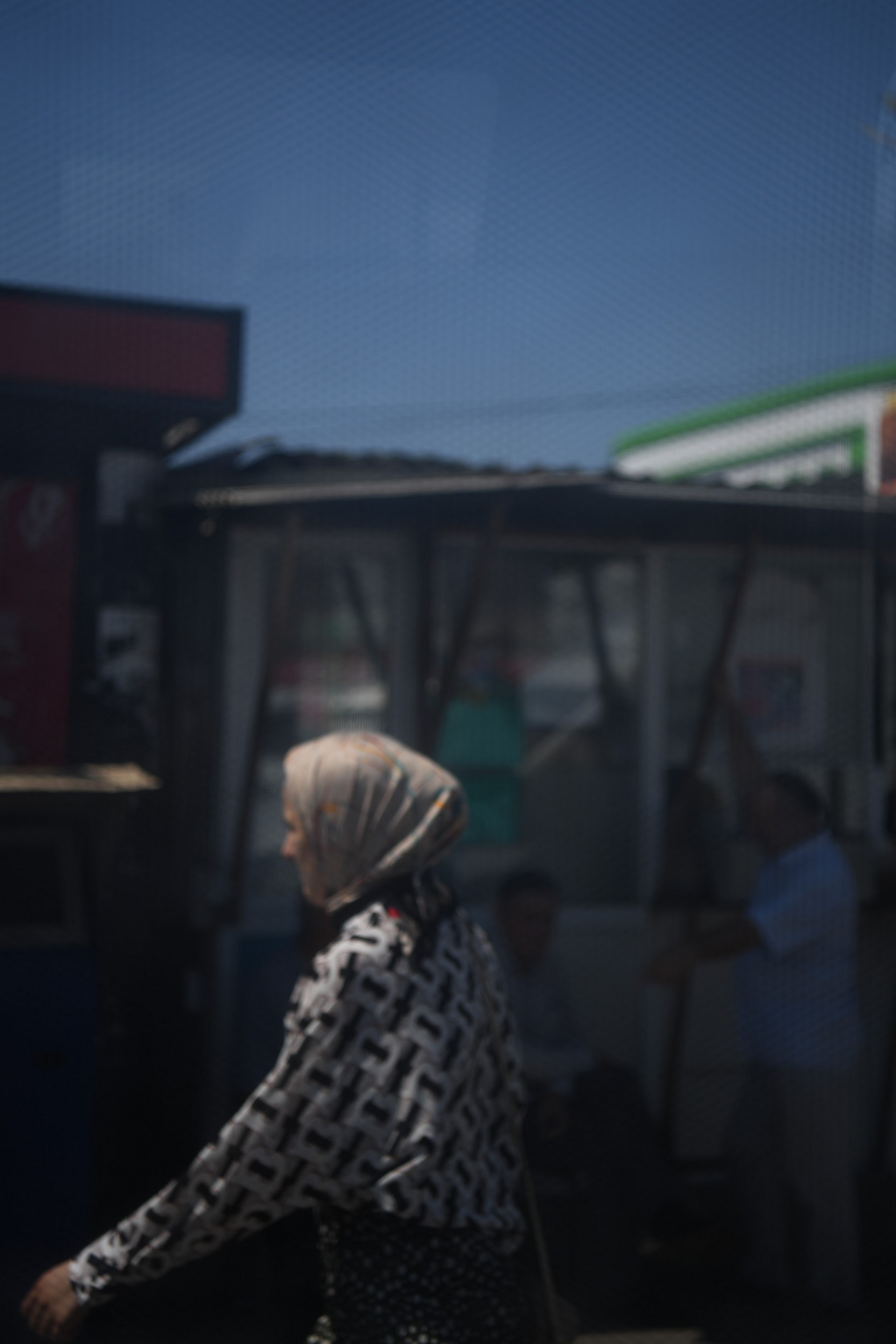
And while words of introduction, of history, of conflict, of suffering or of peace and rebuilding might be adequate here, I would like to start this the same way an imam quite memorably introduced himself to me sitting over a fire on a blanket in the middle of the forest, the dark illuminated by a single bulb hanging from a tree powered by a car battery – with an anecdote. His for itslef, was hilarious.
I:
//<Once, in a faraway time, in a faraway valley, surrounded by the steepest rocks lived a pack of wolves. Young and old, strong and weak, moms, dads, brothers and sisters, close in kinship and also tradition: together, all of them, howling through the night. From den to den, from forest to forest, from hilltop to hilltop. They would live in their valley content.>
<And while the orchestra of thunder played its macabre piece, scaring the pups to death, making them hide beneath their mothers, in the deepest of their burrows, the hail unceasingly ripped through the trees of the valley, breaking their arms, lopping off their leaves, burning their bark.>
<It made them groan like they were in endless pain and leave them look like just the skeletons of something bigger, of something more beautiful, that had been.>
<And while the wolf families hid in their den, first one, then a second and then a third young wolf started howling, howling against the thunder, howling against the pain, howling against the angst – till soon all of them, were howling together, howling together as the pack they were.>
<From den to den, from forest to forest, from hilltop to hilltop they were howling, in a volume unheard, past their valley, past their hilltops, past what they had known. But the thunder did not stop, and the hail continued to lash down onto the valley.>
<Finally, the rivers swelled, soaking the ground, ripping loose all trees, water unceasingly rising, flooding all dens, making the valley into a swamp. Making life into a swamp.>
<First some and then a few, and then more and more of the wolves decided that it was time to seek a new home, a new valley. A valley with trees that still were, a valley with trees that still had leaves, a valley that was not only but also really could be a home.>
<And while not all of the pack did so, many left, howling from pain, but the decision had been made. And while the two-leggers watched them leave, they descended their hilltop from where they had marvelled at their swamp, cracking their backs, petting their leashes.> ![]()
<But the wolves would go on. From valley to valley, their exodus feeling like their new destiny. Some stayed here, some stayed there. Many found their new valley, dispersed over the whole of the mountains. And while the trees might not have been as green, the water might have been cleaner, and the dens might not have been as cosy, the weather might have been more so.>
<Я всегда гордился
<And while the neighbours might not live in dens, might not have fur or might not howl at all, they had four legs as well. And so, the years passed.>
<While the wolves learned to live in their new valley, they did not forget their cousins, they did not forget their dens, and they did not forget how to howl. One day the pain in their heart prevailed and they made a decision – to return.>
<And while not all of them came at the same time, still, every single one of them had such destiny burnt in his heart. So, they embarked onto the journey, from valleys and valleys through valleys and valleys, with only one goal – the valley.>
<On the last hilltops before their valley, they would gather, greeted who had come, and although all of the had a different smell, a different story, had come from a different valley, they all knew how to howl. They all were – theirs, their pack. They had not forgotten.>
<None of their kins, none of their history and not – how to howl. When the initial joy settled, they turned around and could not believe their eyes. Their valley was beautiful, as beautiful as it had ever been.>
<А где ты видел
<Trees strong and sturdy, seeming endlessly tall up in the sky. Dens as spacious as they could ever have dreamed of. They all howled of joy, calling who they had left behind.>
<But what they soon after heard was a sound wholly violent, violent like the thunder they had fled – barking. The barking, tense, like at the begging of a hunt, of another kind of pack. They two-leggers had brought their kins, but even more so, the two-leggers had made their kins.>
<Those kins made the sound of thunder. And the behaved like hail. But there – the wolves did hear a howling, quite but steady.>
<But a howling without a doubt. Although it could not be heard from hilltop to hilltop, and also not from forest to forest anymore, it was heard from den to den, from valley to valley.>//
создает нацию>
II: grozny / грозный {adj. m} // “fearsome”, also “formidable” e.g. Ivan the Terrible
Grozny is beautiful.
Coming from Nalchik and Nazran, you feel like you’ve found the secret door in President Putin’s closet and have entered the next dimension. Not to say they’re not beautiful – but the most expensive tie is certainly this one here. I should start with the origin of the city’s name perhaps, but I’ll just leave it. We’ve heard that before. Then let’s talk about recent history. Eh yes, Grozny was the most destroyed city on earth, that was the UN, that was 2003. But we’ve heard that one before as well. Grozny is beautiful.
Walking down Prospekt Putina you feel like you’re in Paris. Spacious pavements, trees, flowers, crosswalks en masse, trendy cafes, women sporting the latest fashion trends from Turkey. Modern, colourful, self-confident, refreshing. You see covered and non-covered hair. Louis Vuitton, Prada, Gucci. Shops for stylish men’s clothing. Big, black German cars patrolling the street up and down with the occasional roar for drama of course. More often than not, women sit in the back, rarely but as well, in the driver seat. Seems like the oriental version of an all so typical occidental paradise. Western consumerist culture with a subtle, but unmissable undertone.
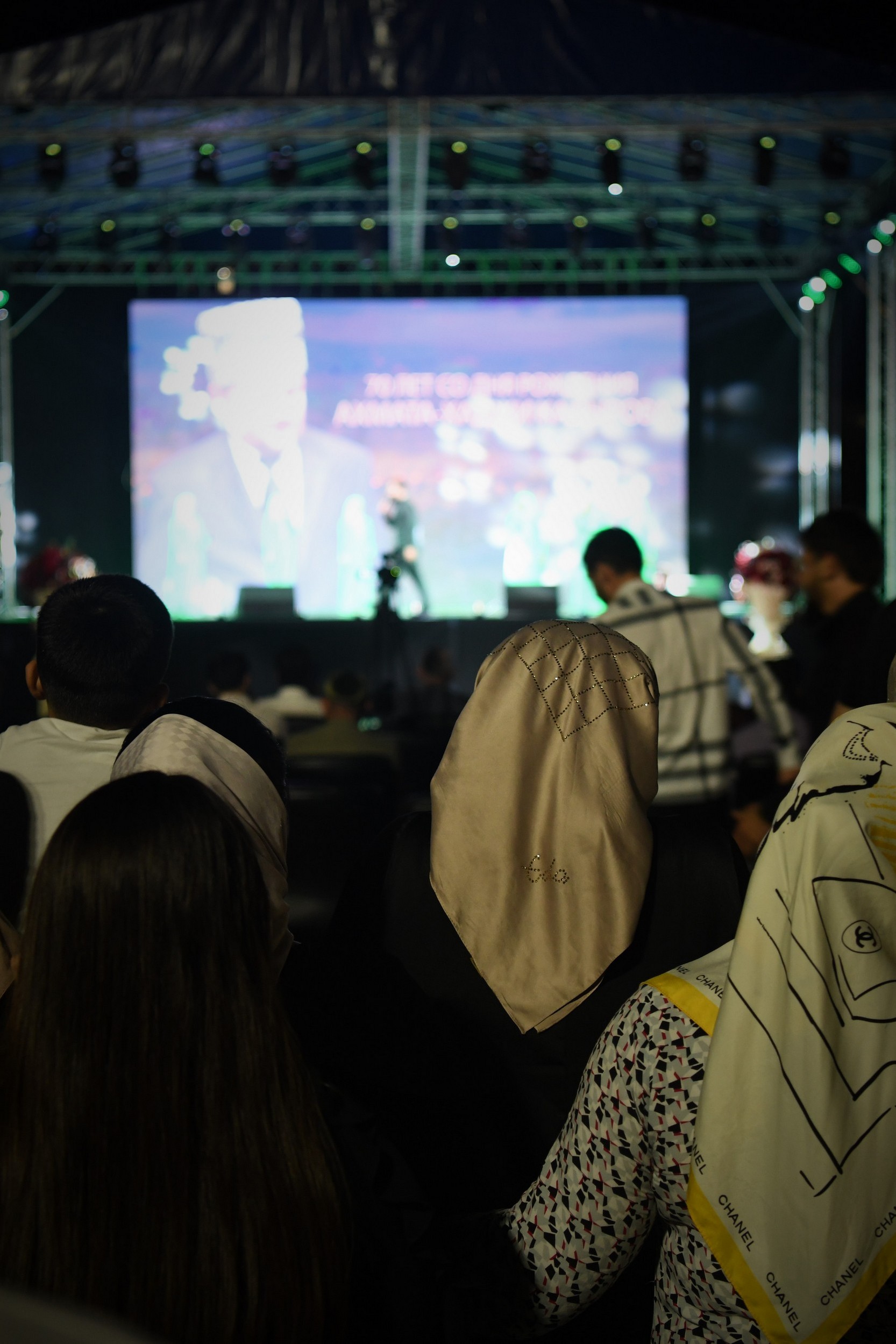
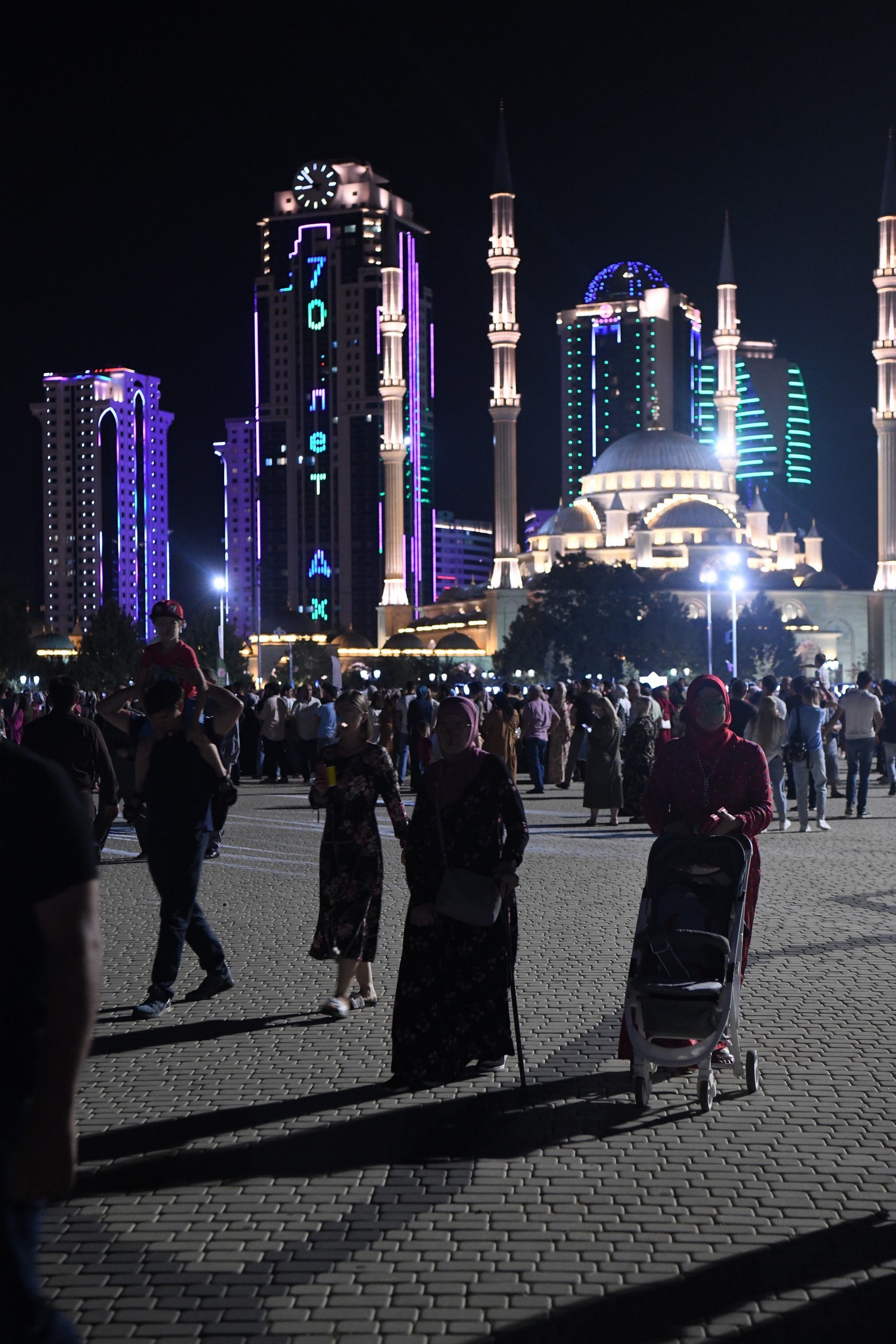
Traditional and Islamic. New Russia? No, new Chechnya.
The restaurants are great as well. Five different McDonald’s knock offs and all other fast food one can think of, Starbuck’s-like trendy cafes that are too pricey and sushi bars that serve pizza as well, Italian restaurants, Georgian restaurants but mostly American restaurants. Families stroll through the streets filled with true entertainers selling Turkish ice-cream from their trollies, women selling luminescent swords, machineguns and magic wands as well as a show maker selling selfies with either the parrot on his left or the monkey on
his right shoulder. There is a lot of young people on the streets. Young families. And above everything, always-present (yes, the president as well but also), those sequoia trees of buildings, impressive, more luminous than all the magic wands, swords and machineguns of Grozny’s pedestrian street together. One of them is a business centre, the other a hotel, you can go visit the roof, great for weddings. The families tend to find themselves on the main square named after the first president, with the huge swing just in front of the sky-
себя победителем>
scraper and the central mosque “Serdze Chechnii” (// heart of chechnya). Turkish style, beautiful inside, with a great adjacent park and loads of tourists as well. Grozny is beautiful. Grozny is new.
No it really is beautiful. But Grozny is also the memories on those randomly placed display boards dispersed in the city centre. While I’m not sure which one exactly the message behind them is, I’m somewhat surprised, in a positive sense, they’re there. Without the context it is difficult to file Grozny, certainly for the masses of Russian tourists. They don’t seem to mind, hopping off their busses in short shirts and short shorts to take a selfie with the colourful skyscrapers.
I ask myself if they do everything on purpose. I don’t think so. But maybe it is exactly this Grozny they want to fall in love with. Or it is exactly these people this Grozny wants to fall in love with.
For every tree there is at least one policeman in Grozny they say. That is Grozny as well. Strolling through the centre you immediately notice the police presence. And while the presence varies from traffic police to armed police, to fully armed kadyrovtsy and the inconspicuous plain clothes sticking to your heels, it is pretty clear that people are not very relaxed. But that’s comprehensible as well.
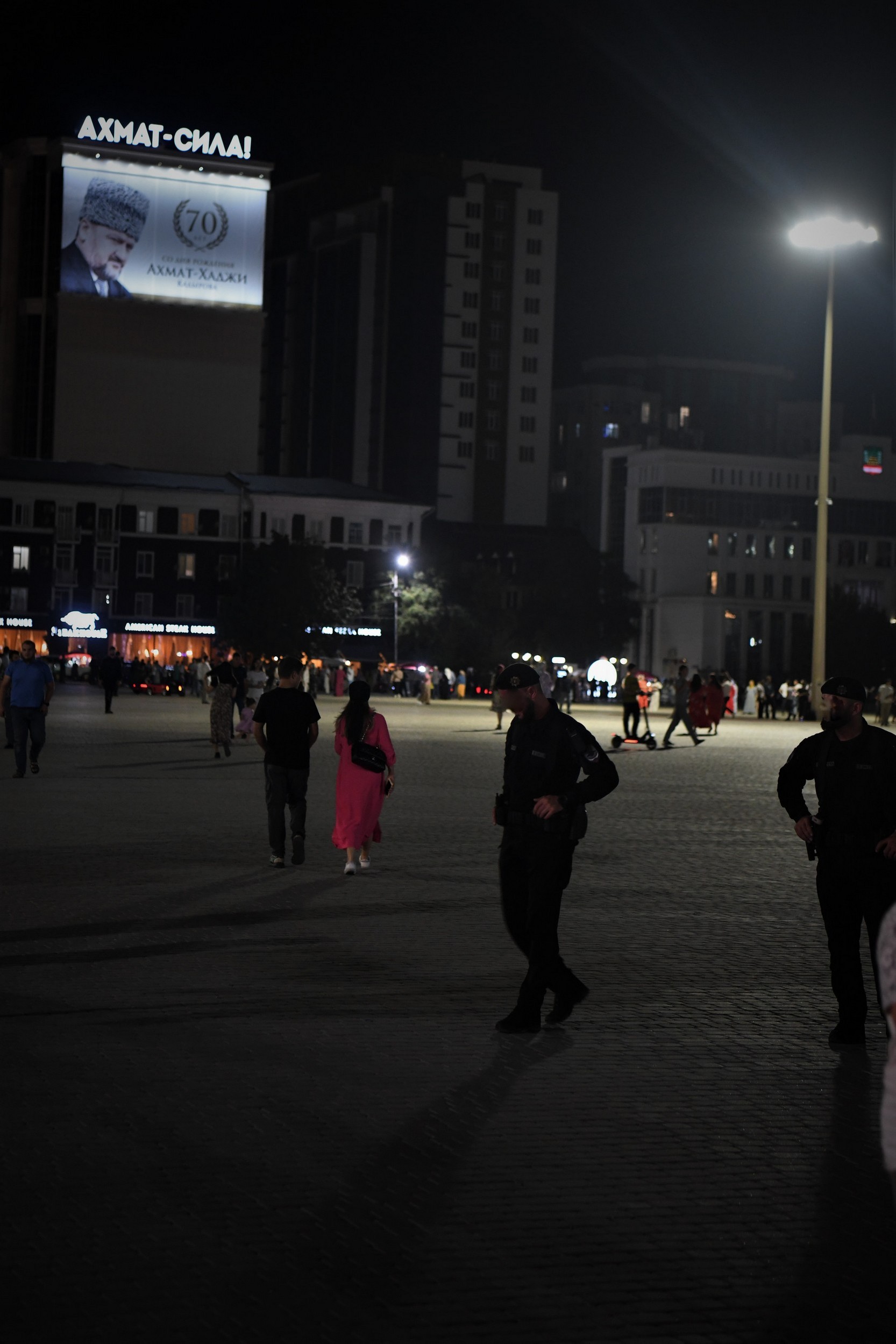
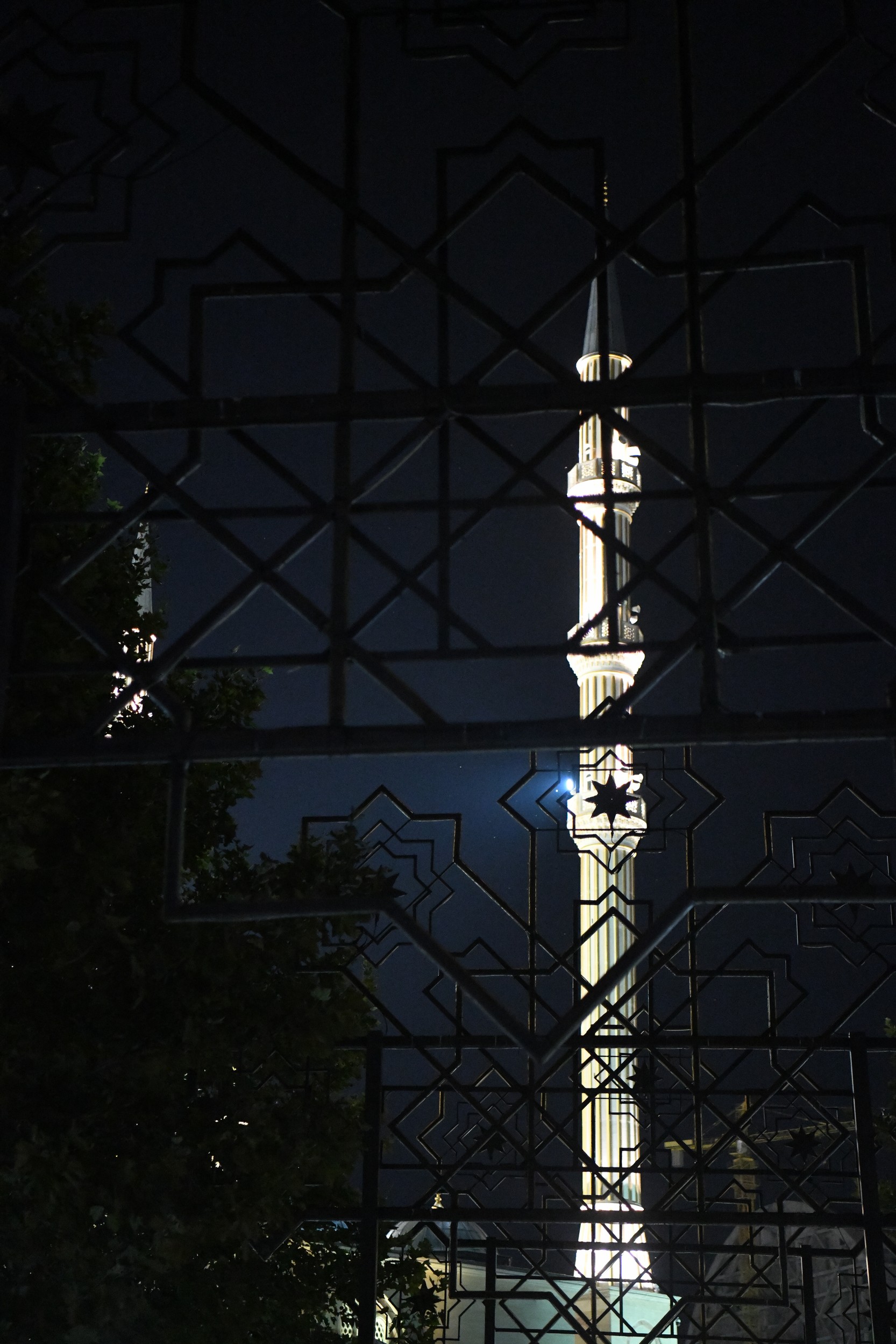
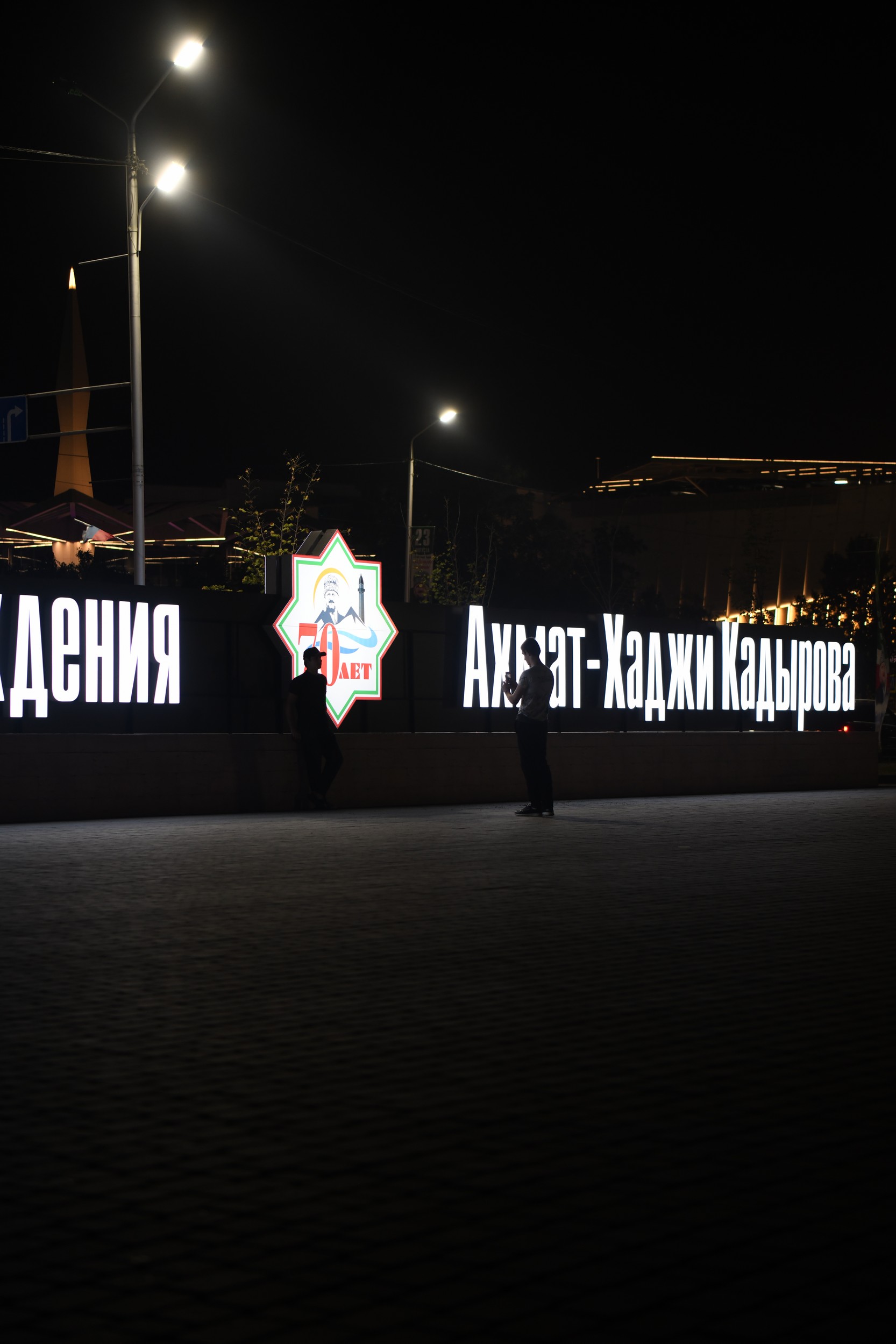
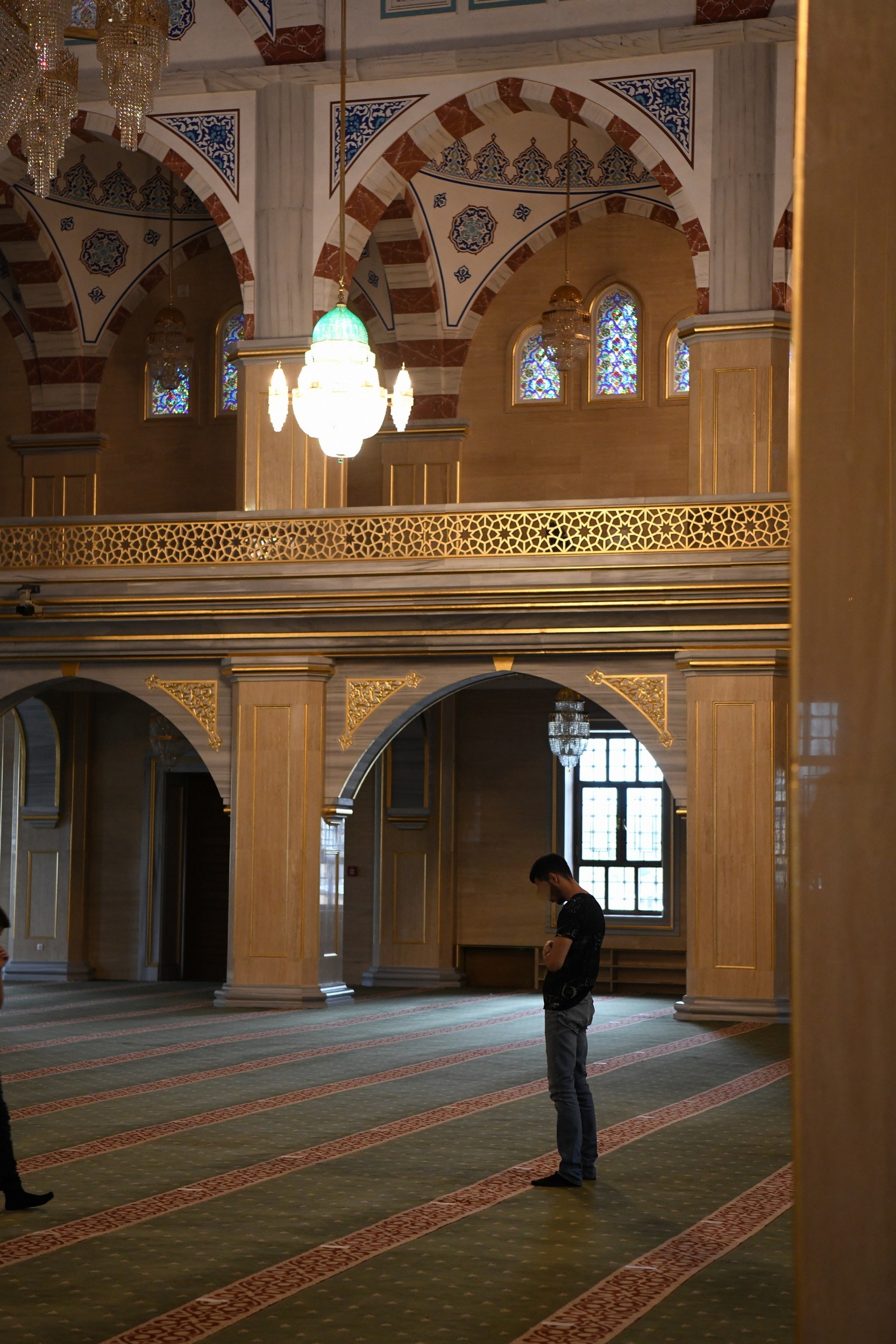
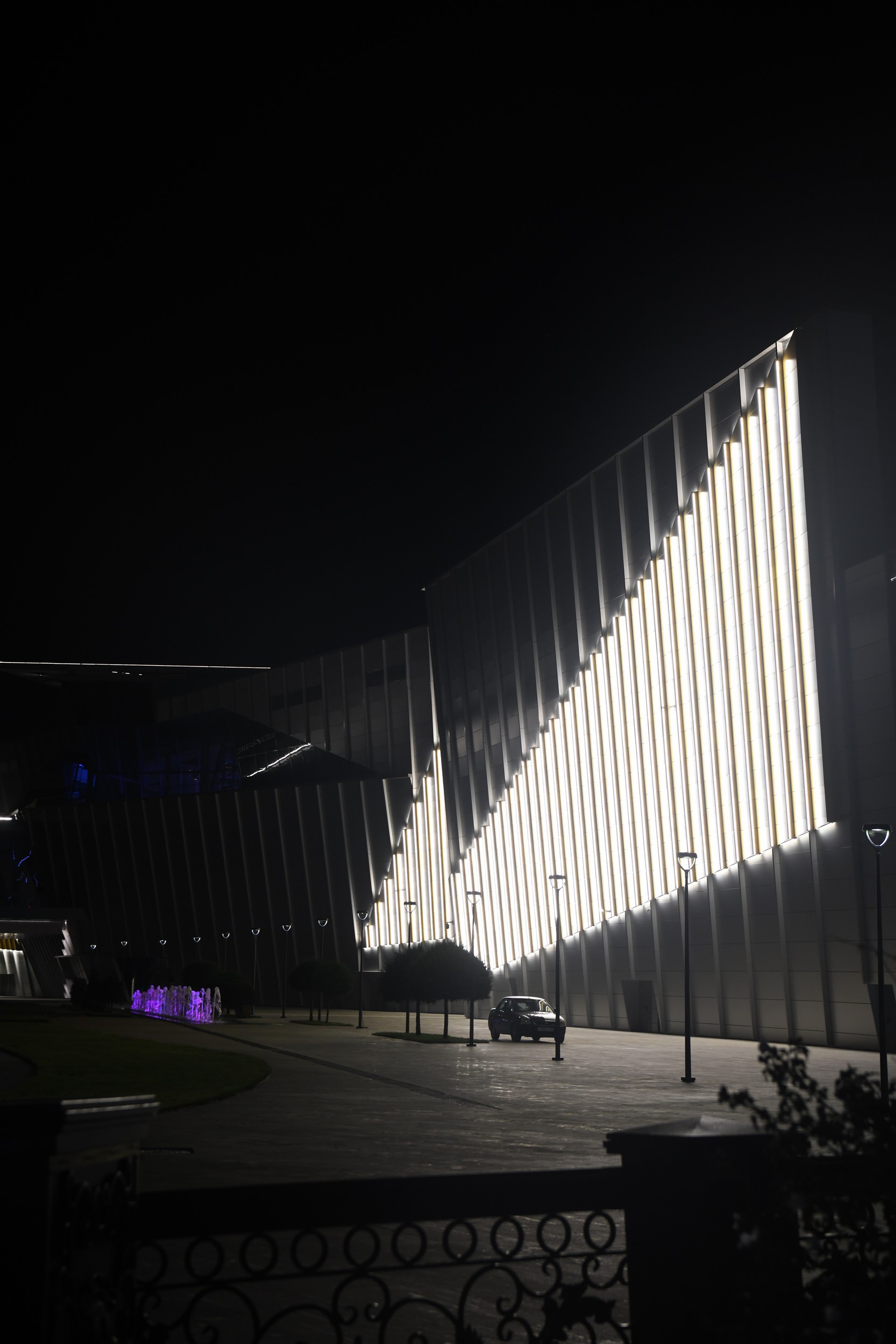
With all this history. But would it be fair to just reduce Grozny to just its history? No, probably not.
II.5:
б erkat
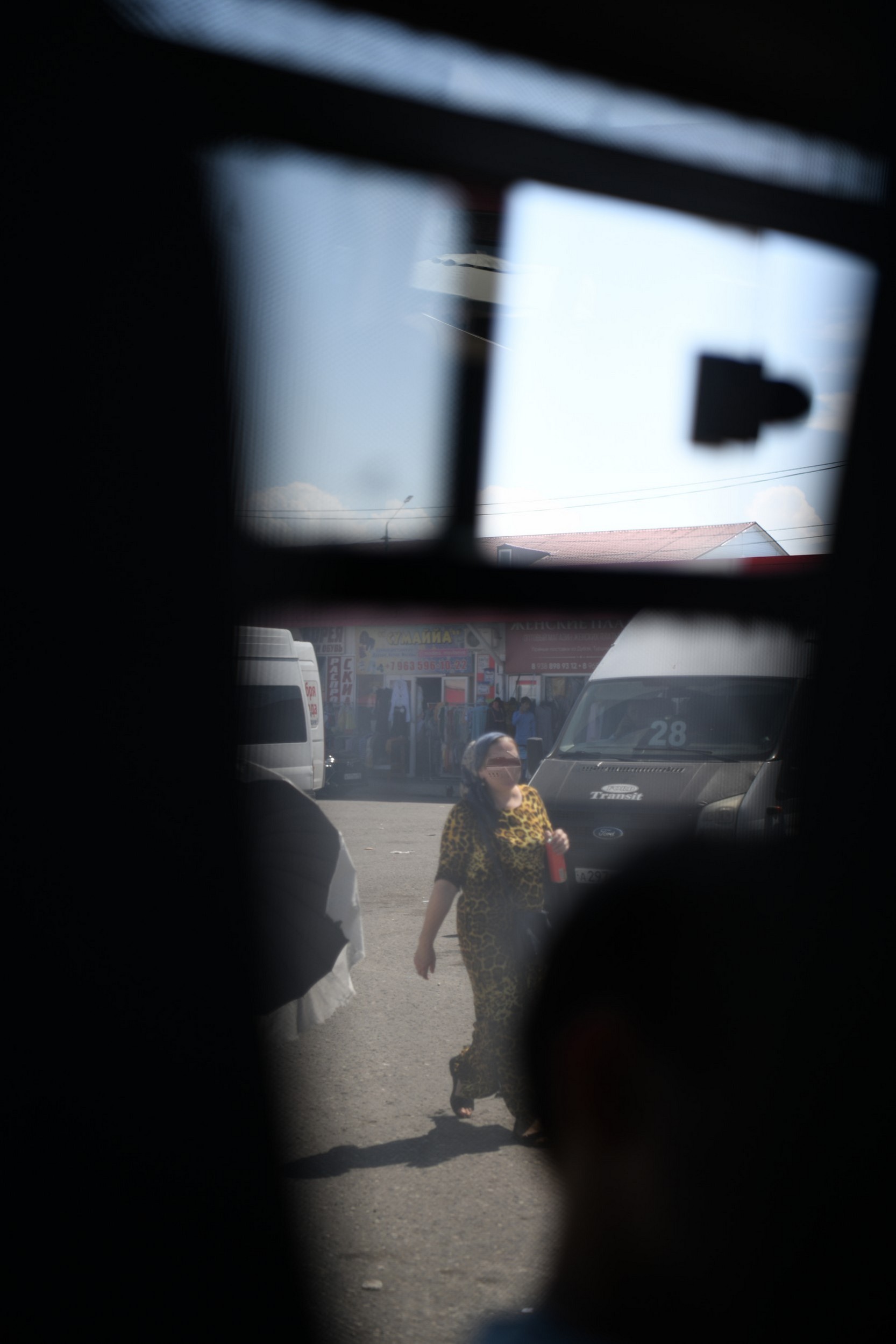
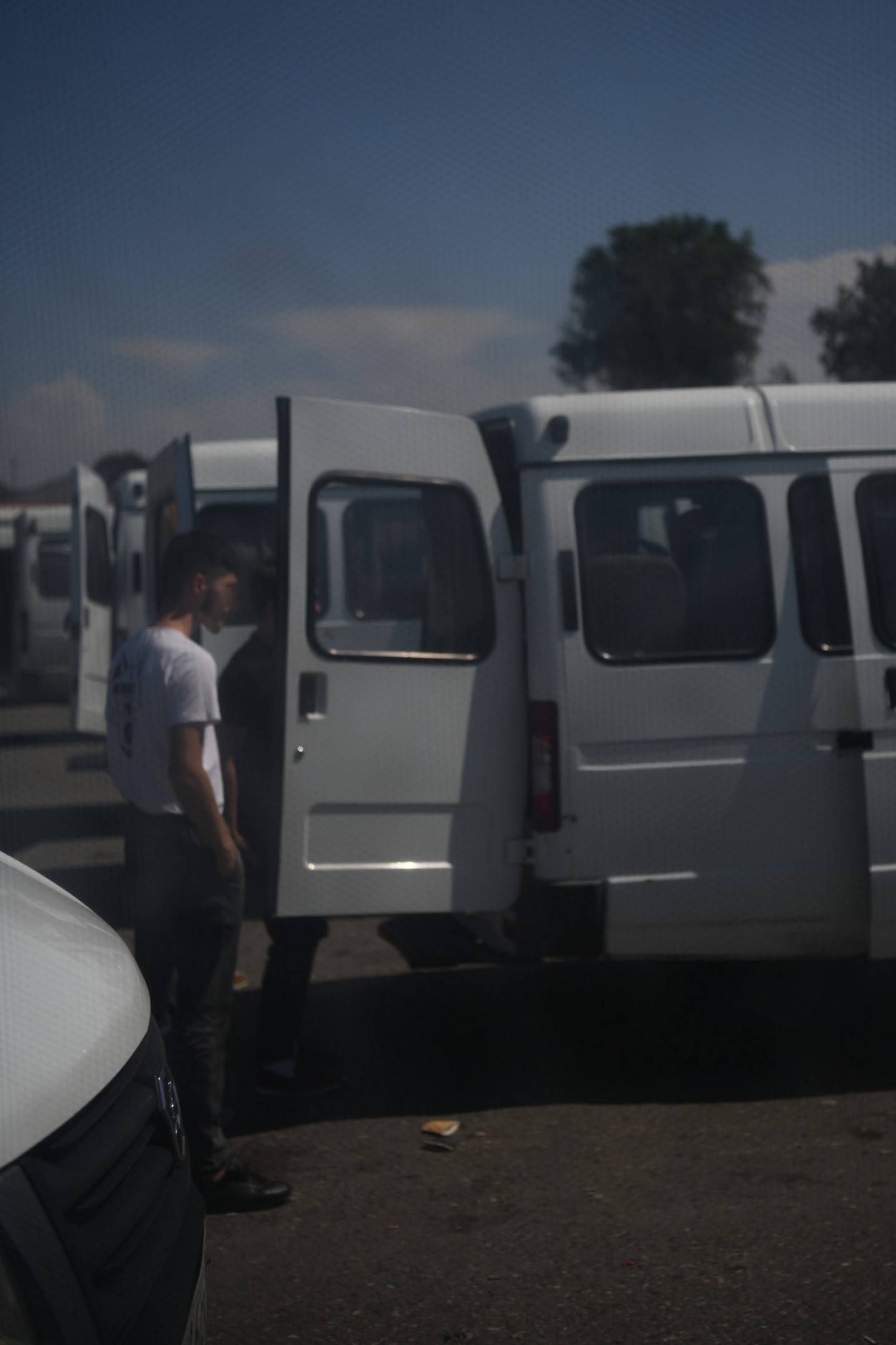
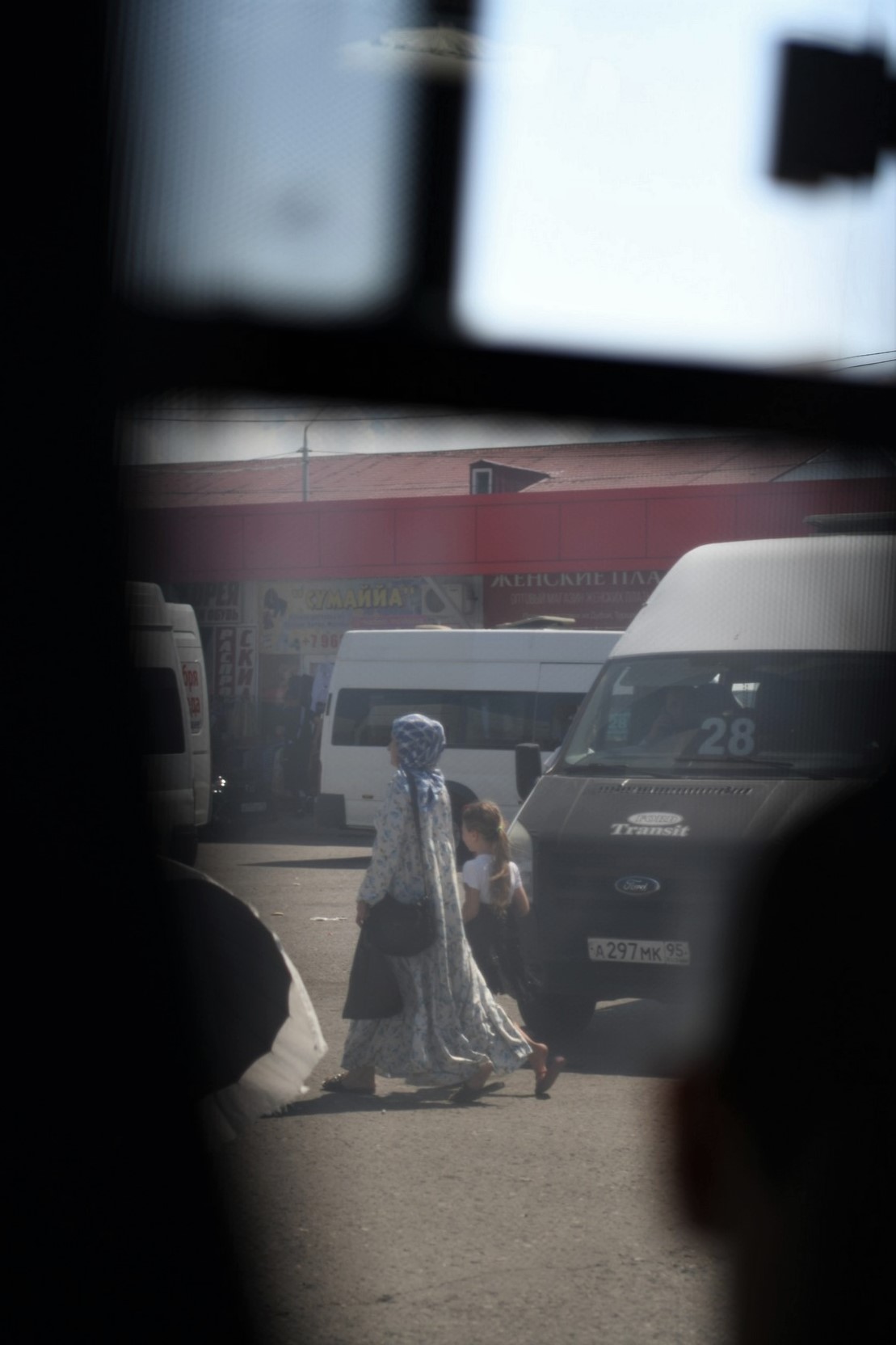
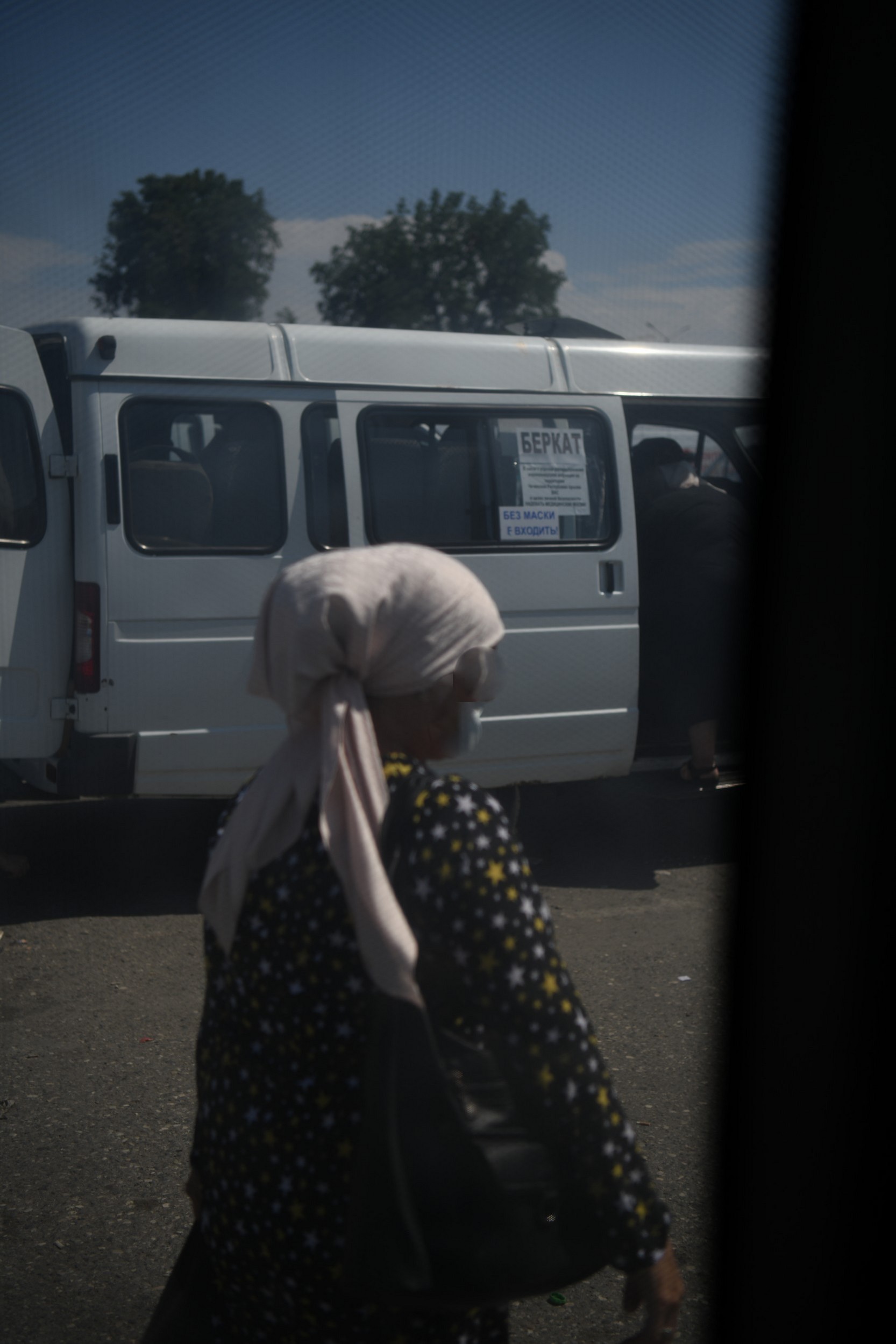
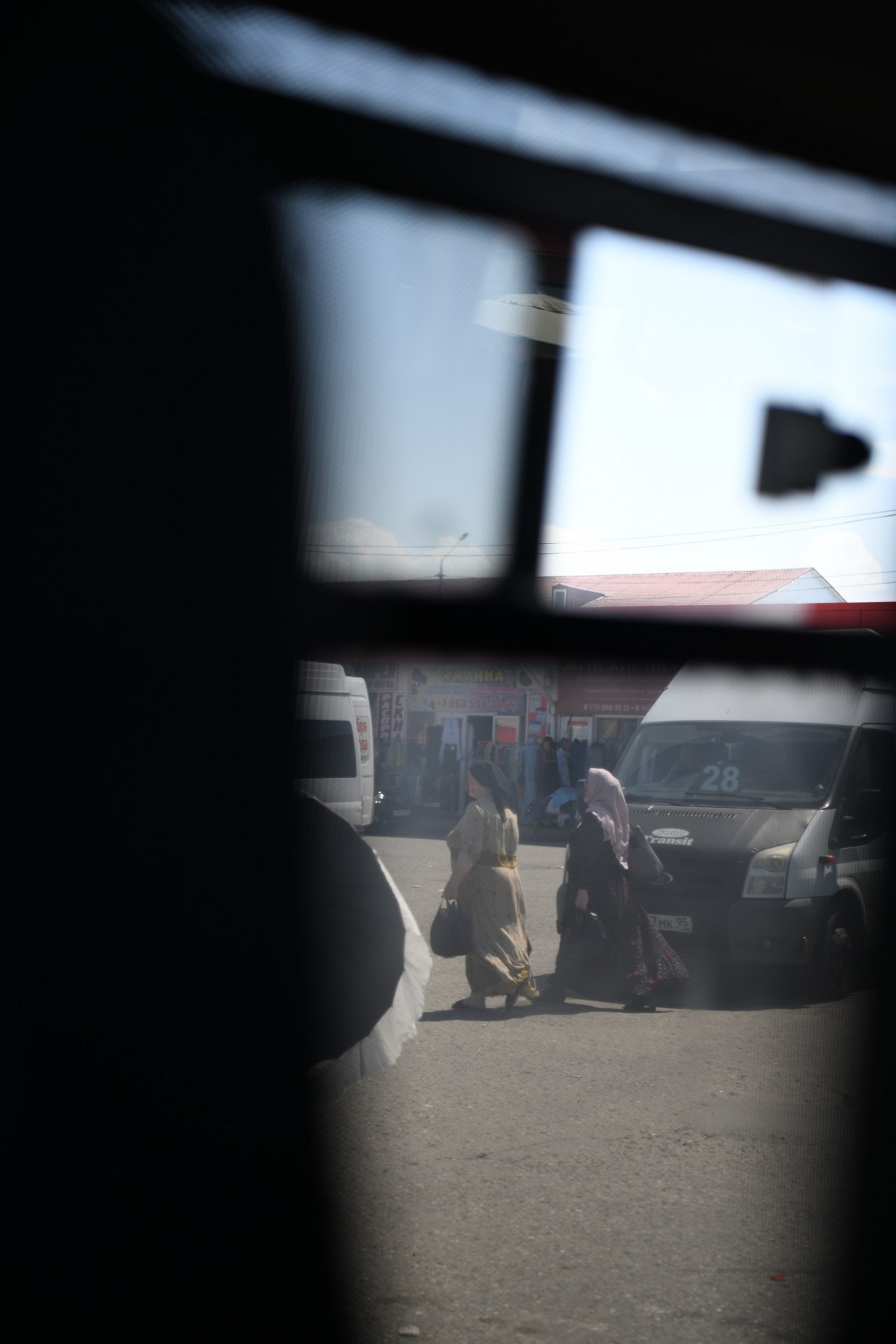
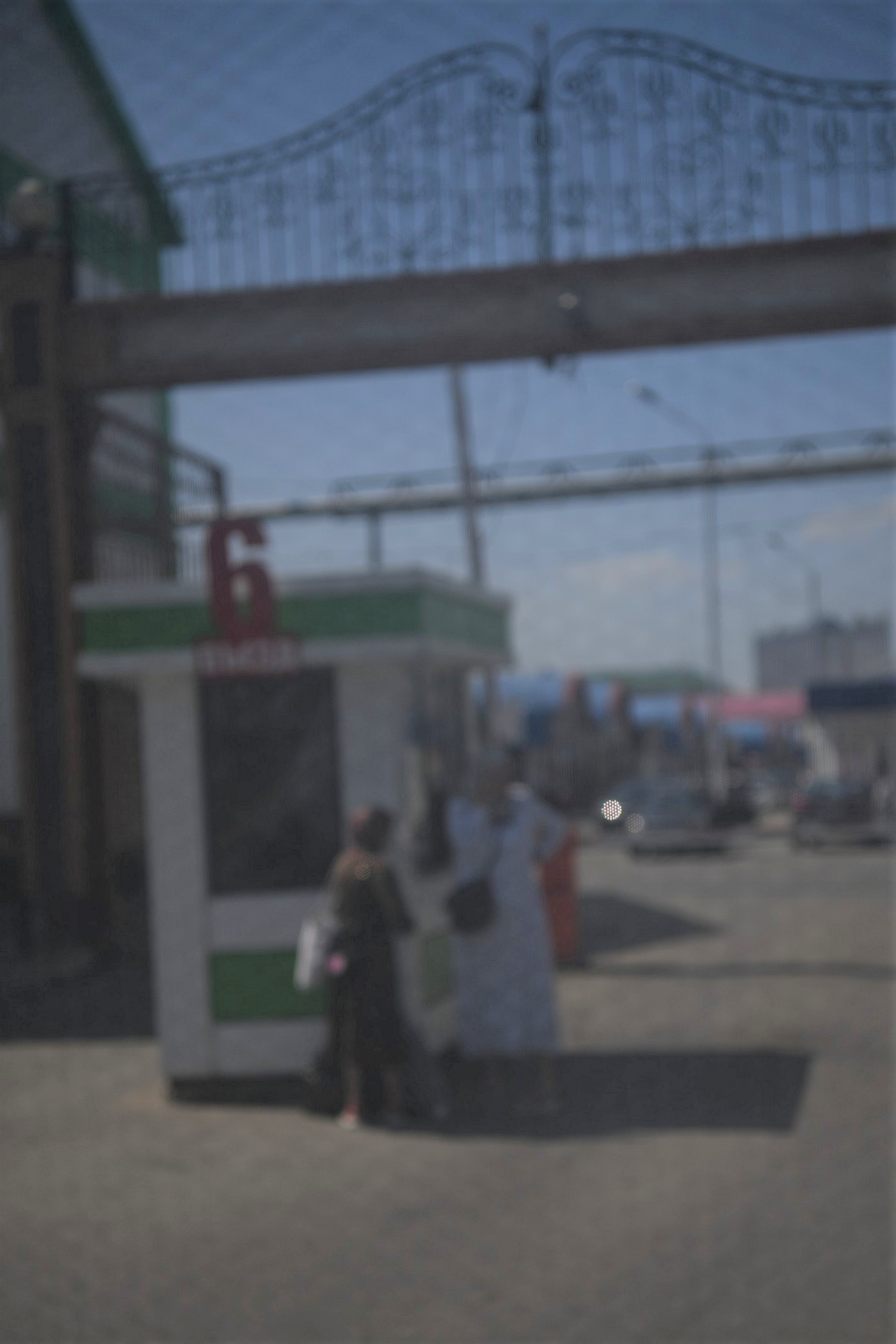
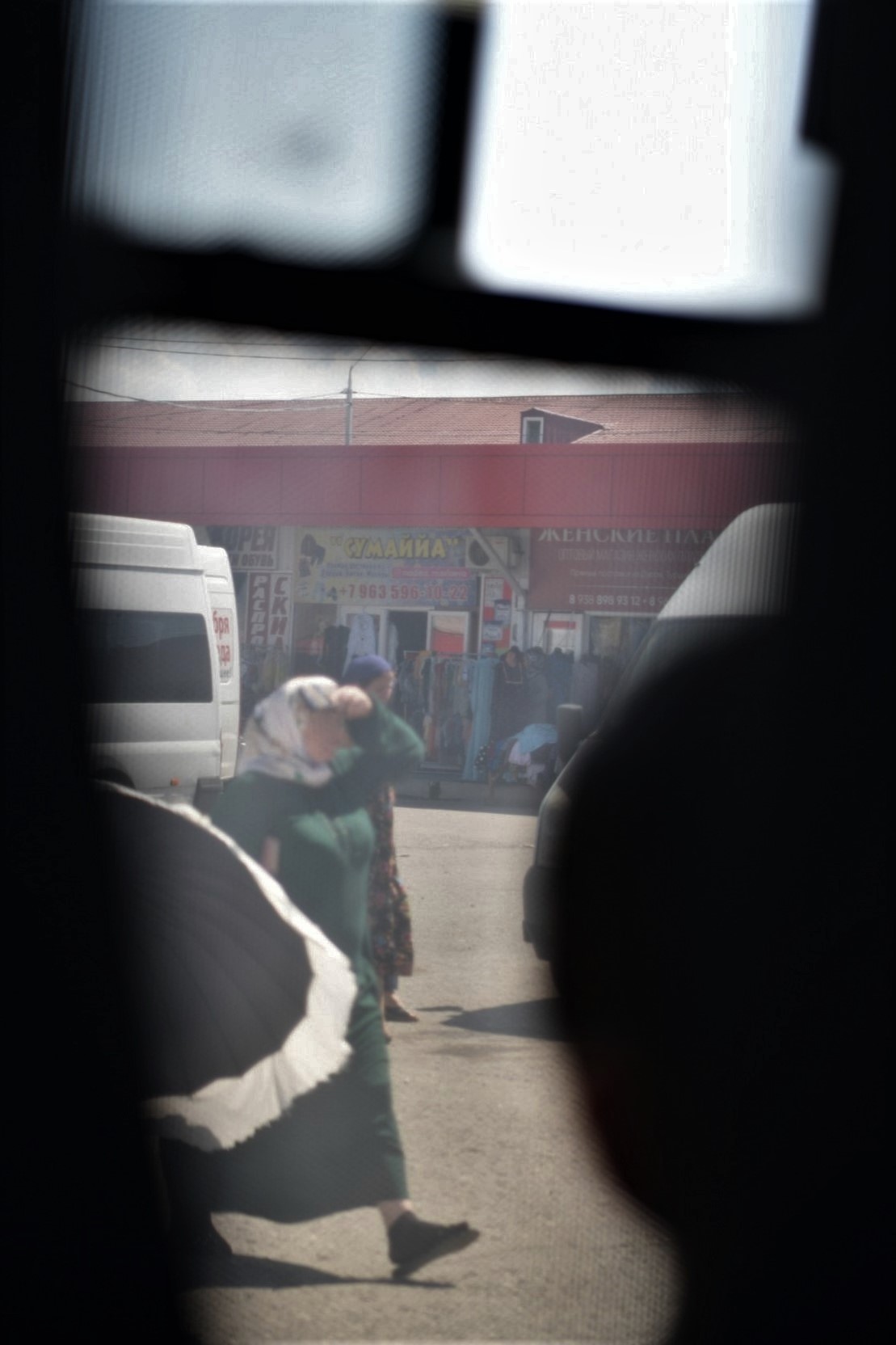
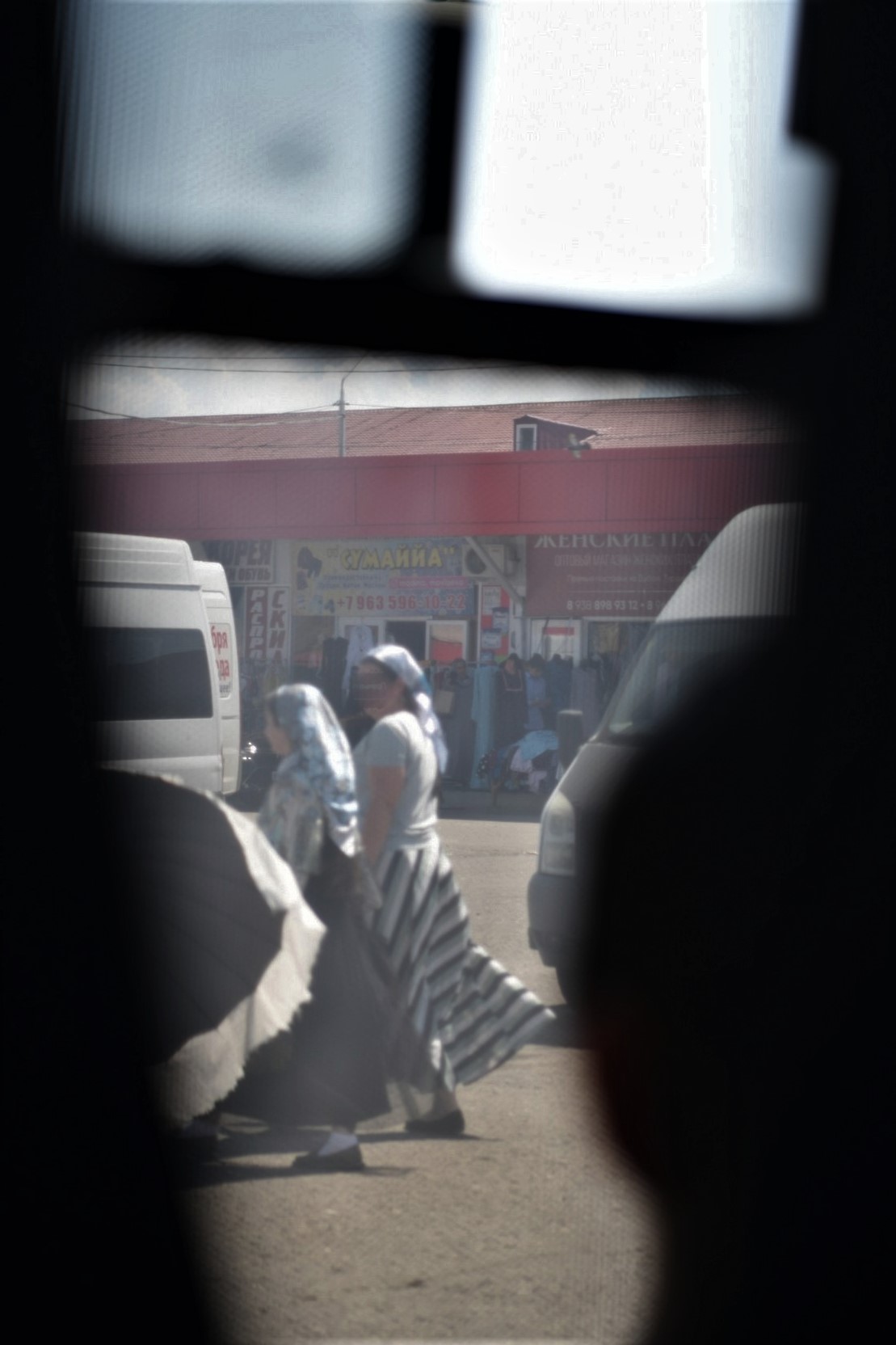
Maybe the most ancient thing of today’s Grozny is the dynamics of its central market “berkat”. The same Louis Vuitton for one twentieth of the price, no sushi but hingalsh for one tenth of the price, electronics for one fifth of the price and flip-knives the length of your arm for I don’t know how much.
Short, a medley of people, Chechen language, cuisine, fabric in all the colours of the rainbow and further,
counterfeit products i.e. mainly ufc shirts and nike sneakers, security guards in random black t-shirts with “Airborne”, “US Army” or “Sheriff” in Latin script on them and you, you losing your money. But that’s Grozny as well, the Grozny. Less to think.
<Учитель
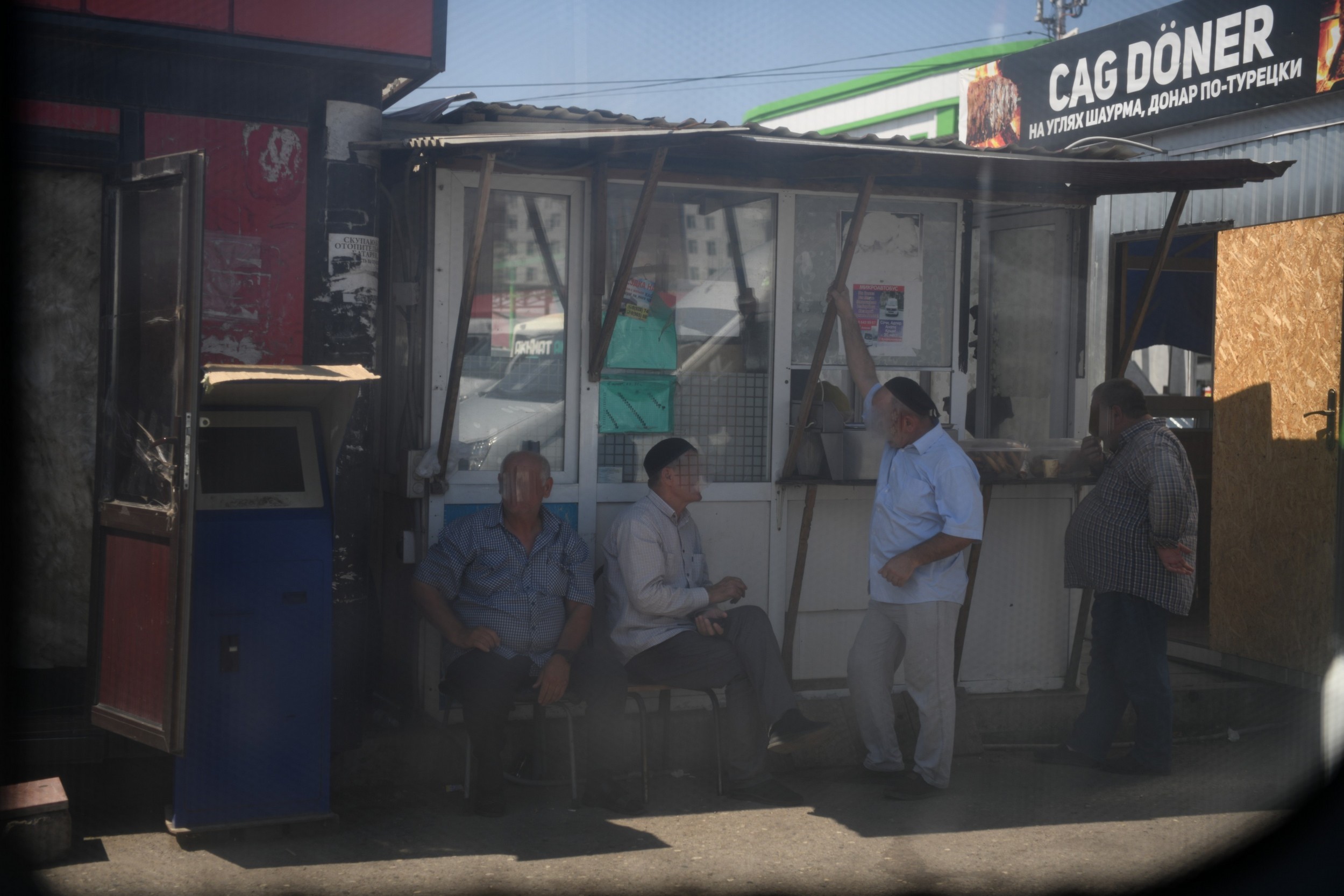
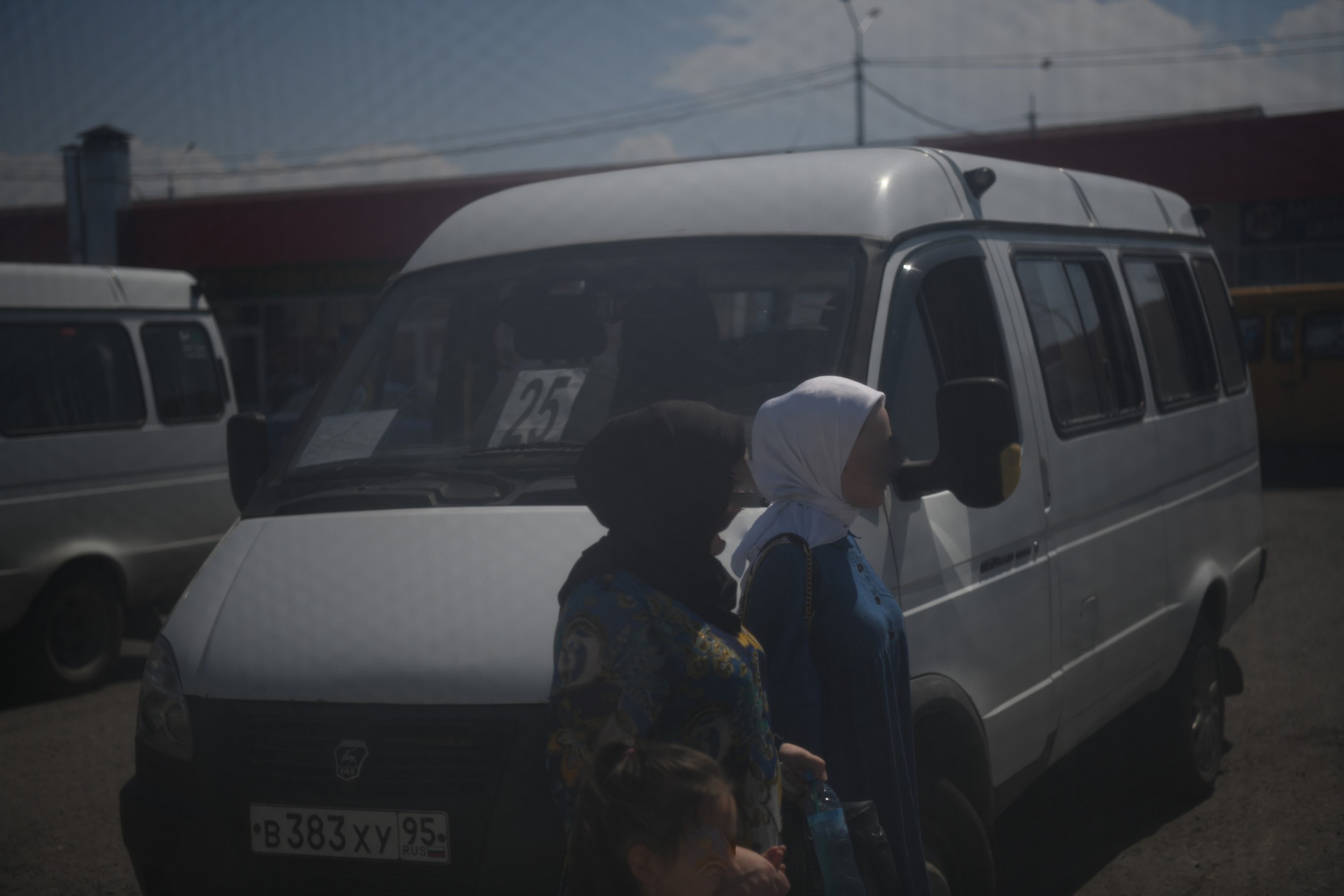
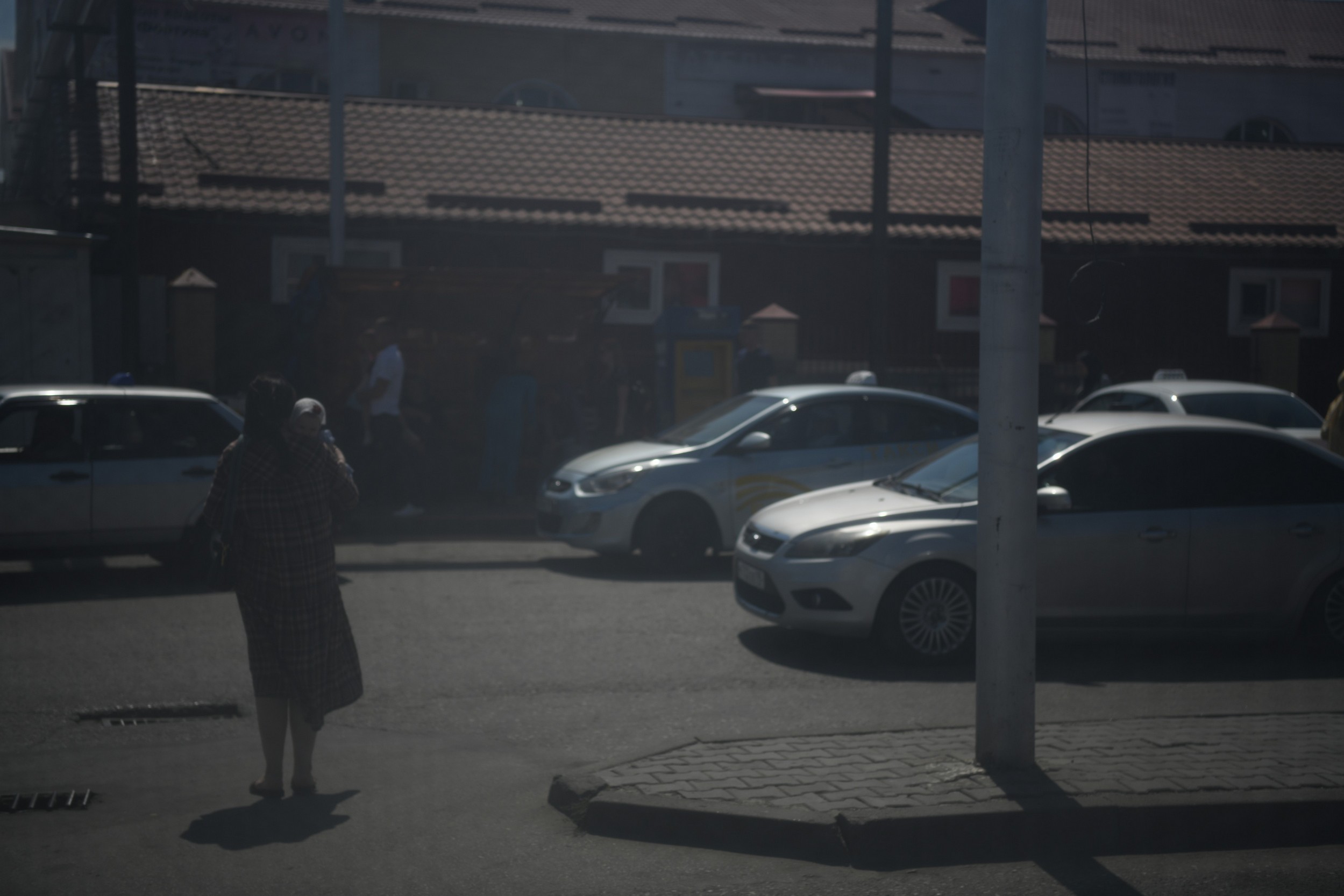
перед бараном>
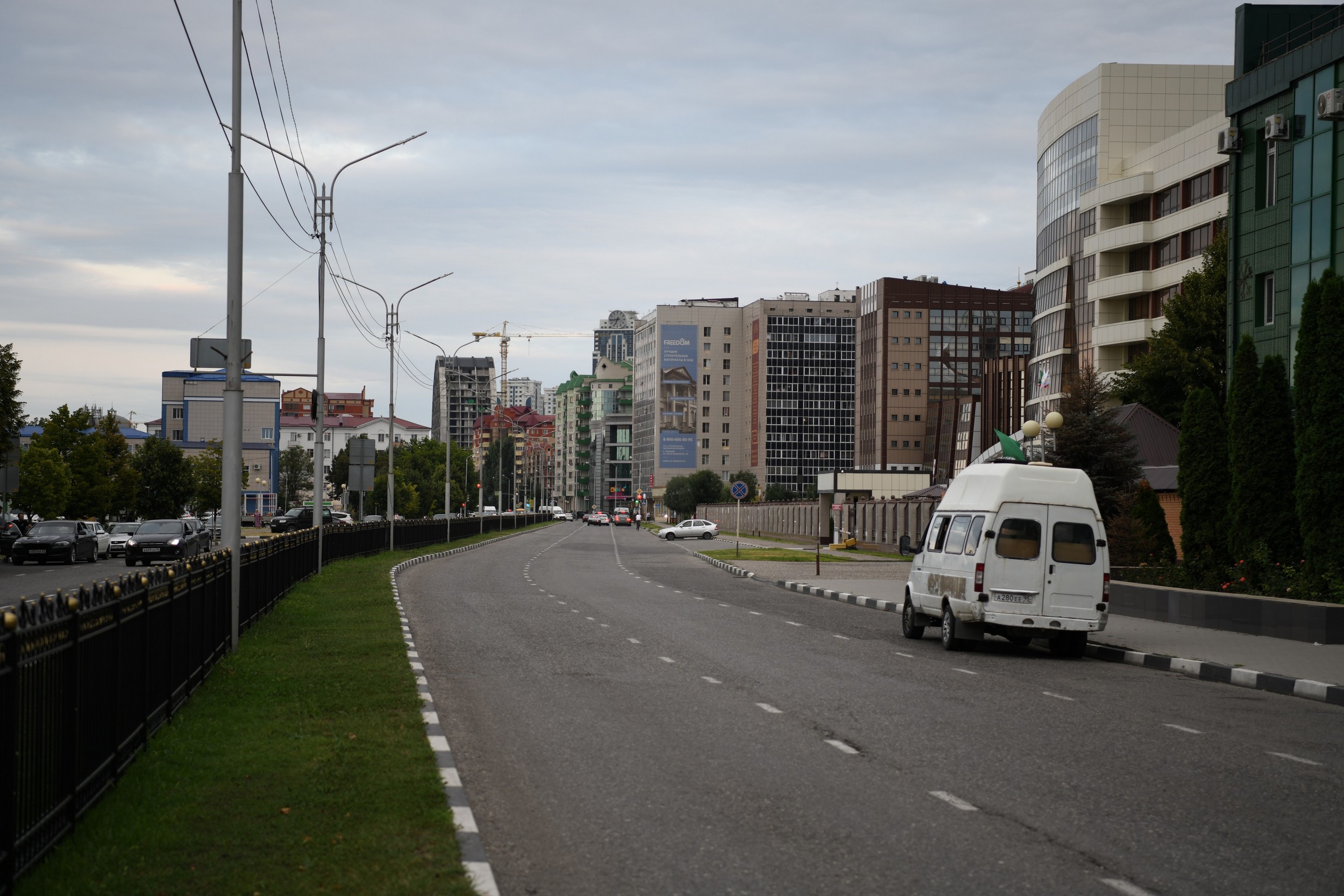
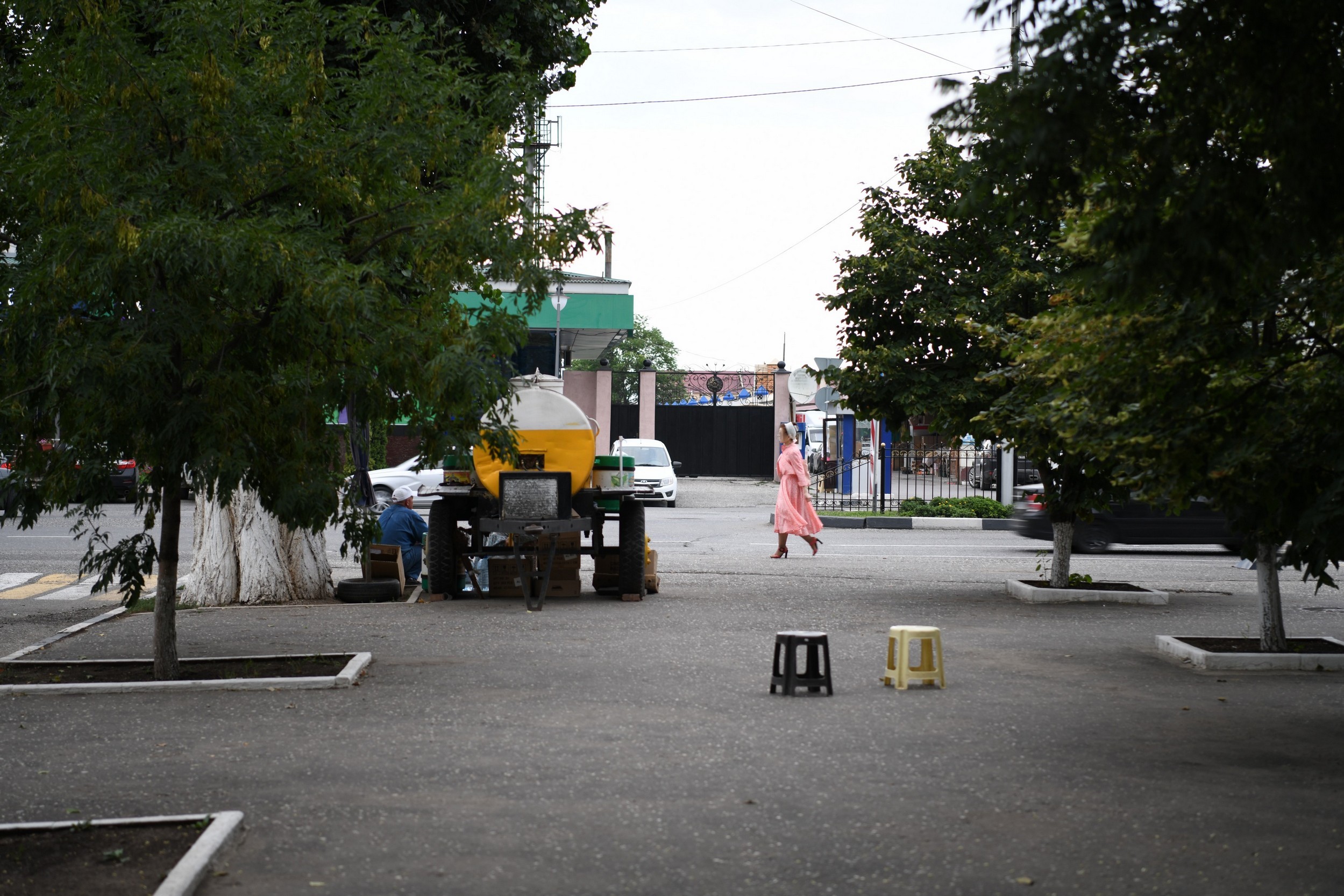
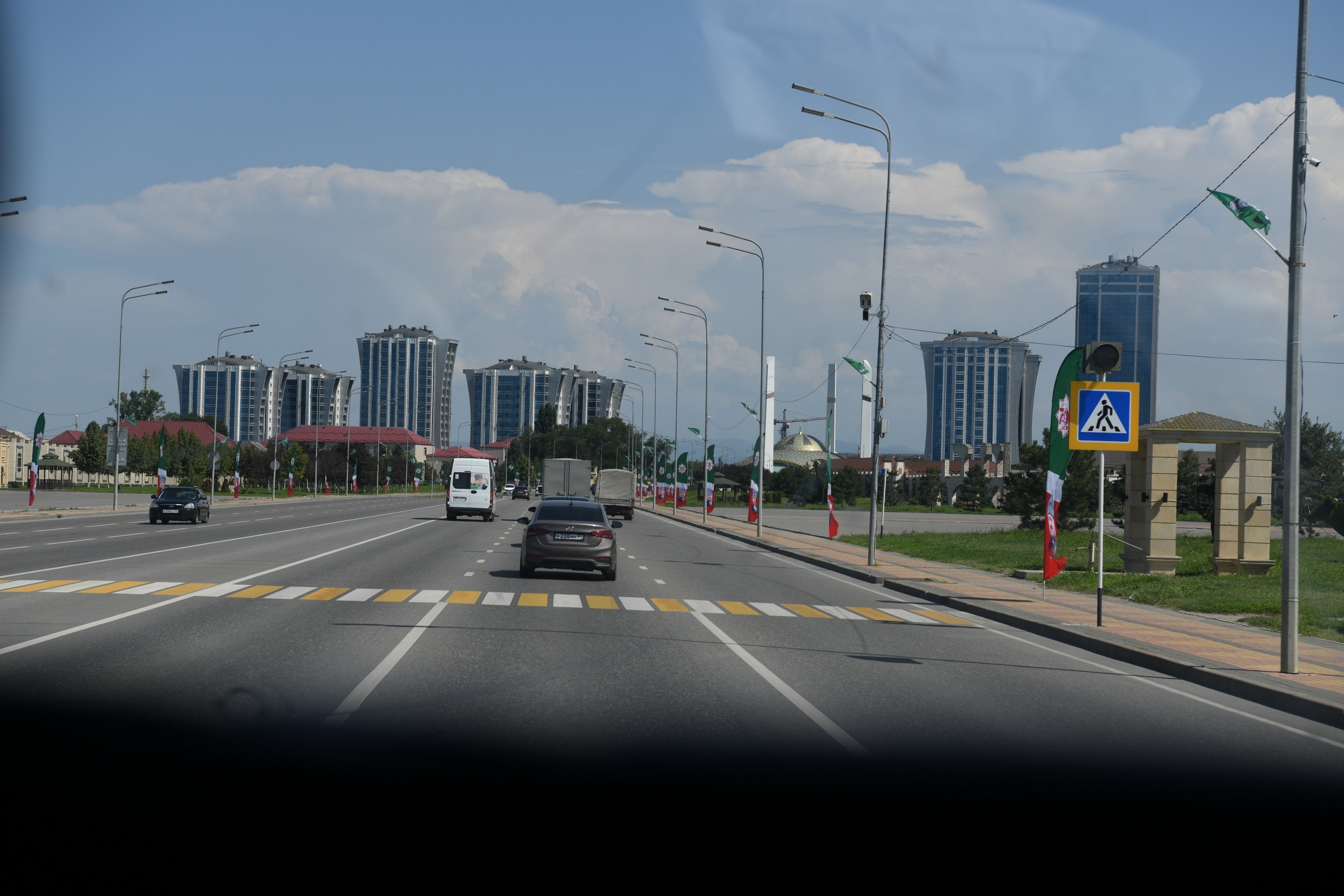
III: hopping rides in чеч
It’s a two-hour drive back to Grozny. No marshrutki going back today. But I knew in advance. The driver asking me where to further I wanna go when everyone elese has hopped off already.
I let the van pass. Next one, I tell myself. I regret it. The rain’s caught up with me. Mountain weather, just like at ours. I extend my arm hearing a car approach. The breaks squeak and I turn around.
Musa* lives in the city, staying with family in the mountains here. It’s the next village, he won’t go any further. Mid-thirties, beard, friendly face, attentive eyes. I agree on waiting out the rain at his. We hurry to enter the huge metal door. I close it behind me, it clangs deafening. f… The sky’s crying but wer’re dry beneath the open pavilion. His female relatives are around, cooking. Musa and me take a seat on the sofa, they offer tea, food. I try to decline but end up eating anyway. It’s good. Dough filled with cheese and butter. Musa tells them my story, they laugh in disbelief, refill my chai. His smaller male cousins take a peak at me from up the house’s windows up the hill. He has relatives in Europe as well, everywhere. I tell them where I’ve been, that I like their country – it’s beautiful. His cousins are here, they greet him touching his back. I shake their hands, they seem
hesitant, unsettled, quick to leave – they do. Musa explains to me how to greet as of Chechen tradition. I listen to it again an nod politely. The conversation dies down. The rain pattering on the corrugated sheet metal, I look up in the sky – deluge. I hear them talk in Chechen. But we’re in the mountains.
The female relatives hardly look at me but chat behind their hands, mix of restraint and curiosity. Thunder. I take another dumpling. <You’ll stay and we’ll find you a wife.>
I look back at them again, they laugh, I laugh. They think I think it’s a joke – I know it’s not.
I smile, <that was quick> I say jokingly, <not even ten minutes here>. They don’t understand so I come again, rephrased. His aunt, the oldest one, laughs at me, the others chuckle. Musa comes in to save the day – he knows I won’t. <But well yes, you’ll have a house, accept our religion…>, he adds with a slight smile. I laugh, take another look at the sky. Hardly better. I hesitate but go for it: <I think it’s time, you know,
*bullshit
at home we say it’s not getting any better, so just go.> Musa nods, he knows time’s over. I thank them, tell them it was delicious and grab my pack. The door clangs deafening.
The Lada runs well. He drives me back to the main road, to the next bend. We stay in the car, he asks me about life at home. It’s an easy life I say. He nods like he knew – he did. <I wouldn’t want to live there, it’s full of politics, here in Russia you have more freedom.> I don’t understand, ask him to explain. <Life might be better at yours, more money, more financial freedoms, but here in Russia they leave you alone.> He nods, <with you there is parties, politicians interfere with your life, here they leave you alone, it’s family and that’s yours only.> <I wouldn’t want to change.>
I’m still not sure I understand, but I’m not sure I can so I leave it.
We shake hands.
I hop out, look up into the grey of sky, take a breath, the air’s cold, smell of wet dirt, forest, the river’s rushing – post-rain. Gravel, squeaking tires, I turn
around – Musa’s gone.
The rain has picked up, a wall of gentle droplets. It has been windy for a while now. The silver Priora comes to a stop. I feel relieved. Not too bumped up as well. The car I mean. That’s been twenty-five minutes. I open the passenger, bow down a little to see who’s driving. Late-twenties, early thirties, brown hair to the eyebrows, full beard, well but not overly groomed, face has an Asian touch but clearly Chechen, dark polo, Armani-style tailored jeans, slip-in suit shoes – good enough. My eyes go back to his face, we exchange a look, he nods, smiles.
I take a seat, throw my pack on the back seat, I see documents and a shirt. , I shake his hand, picking up my accent his face darkens, <russkiy>? I negate – <nemez> (//german). His expression lightens up, he puts on a wide smile, or is it a grin?: <bratiya> (//brothers). I form a friendly smile, laugh and say <yes, yes, brothers … Aryans>. He’s seemingly satisfied and steps on the gas, happy. I’m happy as well, to get going. My seatbelt remains untouched. I tell my story. Wind after wind we travel down the gorge, wet gravel spraying the rock wall, the trees have a toxic green – post-rain.
His arms seem overly long, sinewy, veins protruding, I don’t know why I notice. The Priora’s interior is not new but clean, apart from an energy drink in front of the clutch all empty.
Zubair* tells me he’s from the village, two kids and a wife, a girl in Krasnodar as well, she’s Russian. I note that down in my head. He’s on his way to Nalchik to see a friend. Offering me the energy drink, I hesitate but take it. I respect Chechen hospitality. “From here, they make it here” It’s cold, he’s just bought it. <Chechnya?.. ah> I nod impressed.
I go on talking between my sips but mostly listen. We circle around Grozny’s armada of Mercedes, German cars in general, the autobahn, he and his brother going 320km/h with a BMW in Belgium. I give myself impressed but am tired, the last few interrupted nights doing their part, trying my best to keep him entertained. He grew up in Central Asia, Chechen parents, I doubt it, they are divorced, interesting. Post-deportation diaspora perhaps. He speaks Kazakh, not bad. Behind another wind, suddenly we’re back at the checkpoint, the one with the grim-looking Kadyrovtsy, assault-vest and – rifle, commando goggle and ballistic helmet.
*bullshit
Approaching them, we slow down. I hurry to swallow the last sip of my energy drink and put on the most bored face I can – and nearly spit out the sweet when their facial expression softens to warm honey and they give us a friendly wave.
And.. then they are behind us already. Did I hold my breath again? I don’t know. <They know you?> I look at Zubair surprised. <Yes… yes, they do> pointing at the Yarygin in his fake designer belt, he answers with a big smile and a proud glance in his eyes. I feel like an idiot.
On the asphalt we’ve reached now he speeds up, the tacho jumps to 100. The winds are not any wider than before however. We overtake that tractor and another van, I’m being pressed into my seat. I hatch a look, just out of the corner of my eye, no 30 centimetres away from
where I’ve been sitting the last ten. Not in the waistband, not in a holster – tucked between one of those knock-off Armani belts you can buy on the markets of Grozny in the thousands and a fitting, just as grozny-berkat-looking ripped jeans.
Just like a Mexican cartel runner would do it. Weirdly, I surprise myself by not really being surprised.
I turn my head to my backpack, give the documents on the backseat another look: I see a cigarette-box-sized grainy picture of a bearded man and something golden, red and blue flashing beneath the sheets –
a badge and an ID. Good enough. I look back out the windshield and shift my attention to our conversation. He’s a police officer he tells me. I ask him what he does, he circles without giving me the answer I want. There is no crime in Chechnya he tells me. So what do you do Zubair?
He lights a cigarette, asks me if I mind, I tell him to go on, he opens the window. He opens it too far, closes it again. His cigarette smells unhealthy. <Security>, he says <we work for you – you know.> He shakes off the ash through the window slit, it vanishes in the wind. <People like you – tourists. We work for your safety, you are our guests, and we make sure nothing happens to you, night and day.> Hm, ok. I hold myself back and give myself content with the answer. Shift of five days he tells me. Five days work, day and night, five days
free, like now. I ask Zubair whether he works for the Chechens or the Russians. He says he doesn’t understand. I rephrase the question. <MVD> – so the Russians, which in the end is the same he explains –
<I work for my homeland>. We pass another checkpoint – they greet us.
They look less scary, traffic police. As we continue on, he laughs, as he enlightens me, at their uniforms, comparing them to an East Asian country. I ask Zubair about his training, education. He’s been serving over a decade. He gets a call, a woman, his wife? I can hear it on speaker, they speak in Russian, talk about another person, he tells her to wait for him, he’s gonna handle it. He talks about his pistol, no need to worry, a problem solver with him, always. She becomes quiet, they agree on something.
I look out the window, we’ve reached the plains. Corn fields interrupted by water towers and red walls. He ends the call. Zubair gets back into our conversation and goes on monologizing about his years at the acad-
-demy in a Russian regional capital, the different steps – I nod – the ranks – I nod – his salary and future pension – I nod a few more times.
He turns away from the main road – I notice. He asks me about salaries and pensions in Europe and while I tell this story another time, the countryside road becomes a village road. I check where we are on my phone. Red walls interrupted by side streets – then red walls again. After a few minutes he asks me if I was in a hurry, I say not really. We’re gonna pick up a friend and then he’s gonna drop me off, he tells me. I agree, being happy with the prospects of a comfortable ride to the city. We don’t find the place, so he gives the friend a call, we circle twice. He’s late so Zubair decides to get snacks from a nearby gas station.
As we hop out the Priora I see him upright for the first time, he’s tall, slim – but musculous – but also really slim. The tight jeans don’t make him look any less slim. He disappears in the isles.
Coming back from the toilet I look at him another time. Two meters, full beard, Armani jeans with Armani belt, Russian pistol, black polo and suit shoes – he seems a bit misplaced between the 3 female shop assistants. Or actually, he does seem to
be at the perfectly right spot. He asks me what I want. He won’t let me go without having bought something. Mars? No. To keep it quick and simple I go for the same as him: snickers plus cold, canned coffee. He pays. I don’t even try to get to my cash out.
He asks me about some mobile game. We make our way back, return to our waiting spot. <Yeah, I’ve heard of it>, I answer. <Did you play it?> <No sadly… I stopped playing years ago.> <Why?> I try to compose a good answer. <You know, I’ve…> He looks me in the eye: <You’ve grown up?> <Eh.. yes, that’s right, I’ve grown up.> I look at him waiting for his reaction. He doesn’t look at me again but looks out the windshield, nods: <I’m a streamer.> I take a bite of my snickers. <Oh.?> <On Instagram.> I don’t know what to say so I continue eating in silence. Mouth full of snickers I ask about his pistol. <Yes, it’s a good one.>
<It’s the best one we have.> He seems a bit confused, nervous by my interest, pulls it out of its space in the Armani belt, pulls out the magazine and sticks it in my face. I take a look.
Fmj, steel-cased, the round on the top having a darker case. <Real>. I nod.
Yes, Zubair I know – and never doubted. He puts the pistol in the door past him, away from me, but almost immediately gets it back and puts it into its space in the Armani belt. He seems out of balance. <Six times a week I train.> <Six times, that’s a lot.> <Others do much more – 4 hours every day.> <They shoot backwards and with mirrors and stuff.> I give myself impressed.
The friend appears to relieve us. I offer to sit in the back and hop out the car but Zubair waves me back in, the friend sitting in the back. While we continue our journey, I chat with him, small-talking, he does wrestling. He’s pretty good. We reach the highway to the city. I tell him I’m German, he doesn’t believe me. They speak in Chechen.
It’s getting dark. The traffic has swelled up. They switch back to Russian and tell me about the soon-to-be birthday of the first president. <It’s gonna be magnificent, fireworks, celebrations.> After another 20 or so Zubair turns into a side street leaving the highway. I see cloth shops, religious shops, car parts. Where are we? They hop out at one of the shops, as they explain: to buy sneakers. That must have been the context in Chechen I was missing. Zubair asks if I need some as well,
but I decline. Getting out the car I notice the banner on the back window. <A good man> Zubair tells me pointing at the window, <a really good man.> I nod – <da>.
They disappear in the shop, but I can still see them. It’s gotten late. I think when and how to get back to the city, answer a few messages. I see the scrapers tickling the sky at the horizon. Not too far. When they get out Zubair tells me that they’ve changed their plans – we’ll have to go separate ways. But that’s ok. Somehow I don’t mind for the detours to end here.
He explains to me where to take the next avto stop, <all of them are going to the city>. I shake his hand, thank him and wish him the best, leave. I don’t turn around but see them on the crossing, driving back to where we came from. Barkala, Zubair, barkala (//thanks).
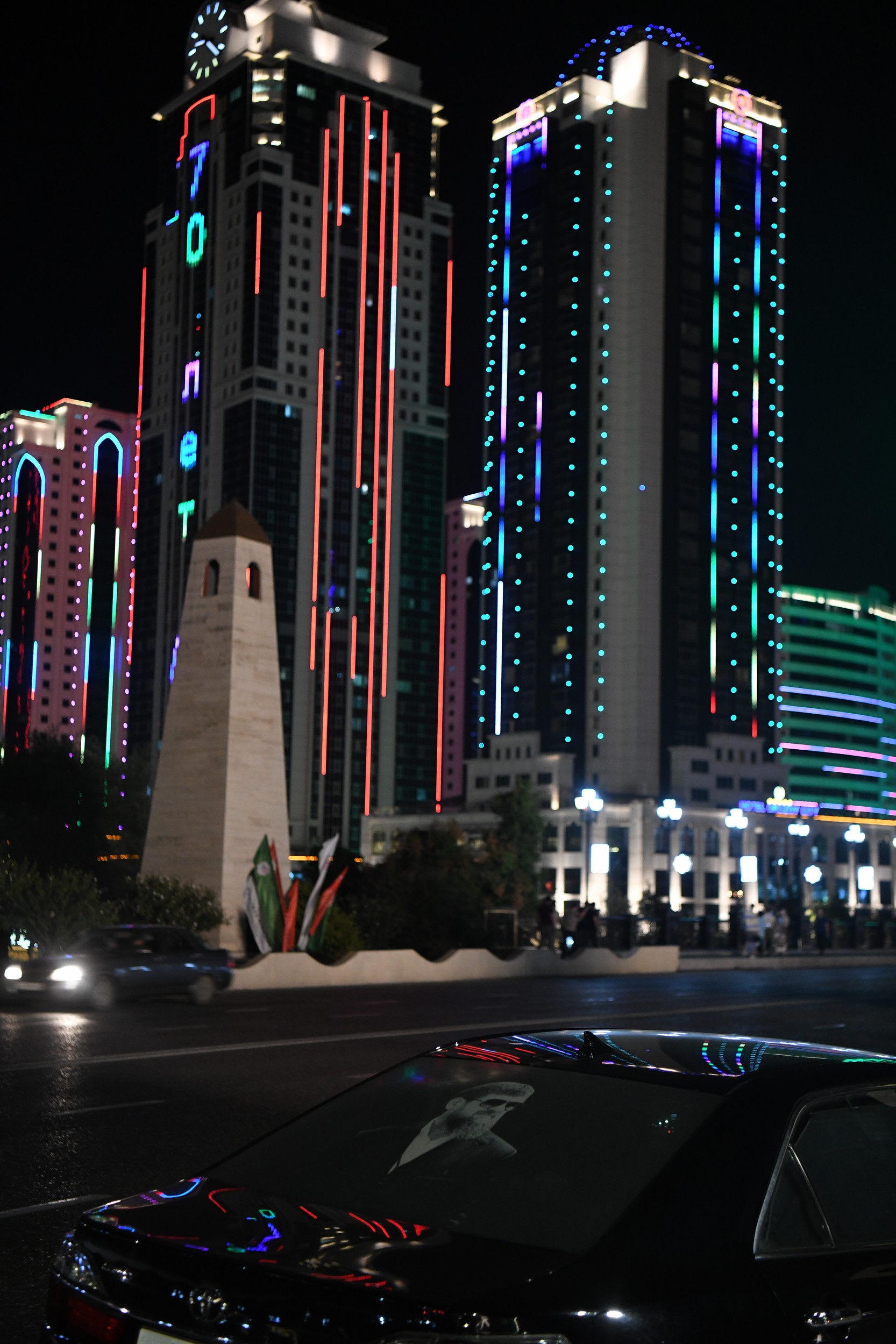
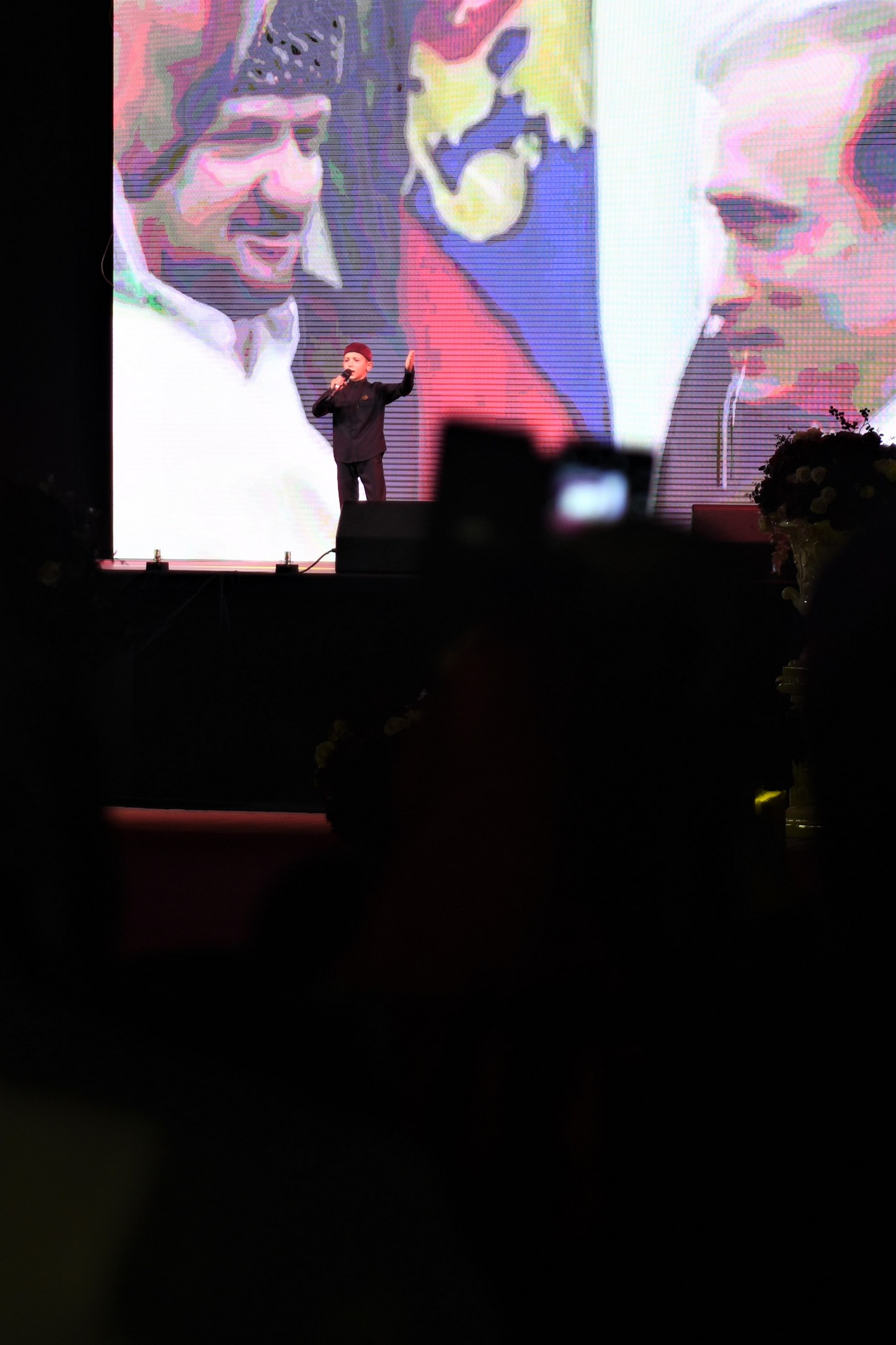
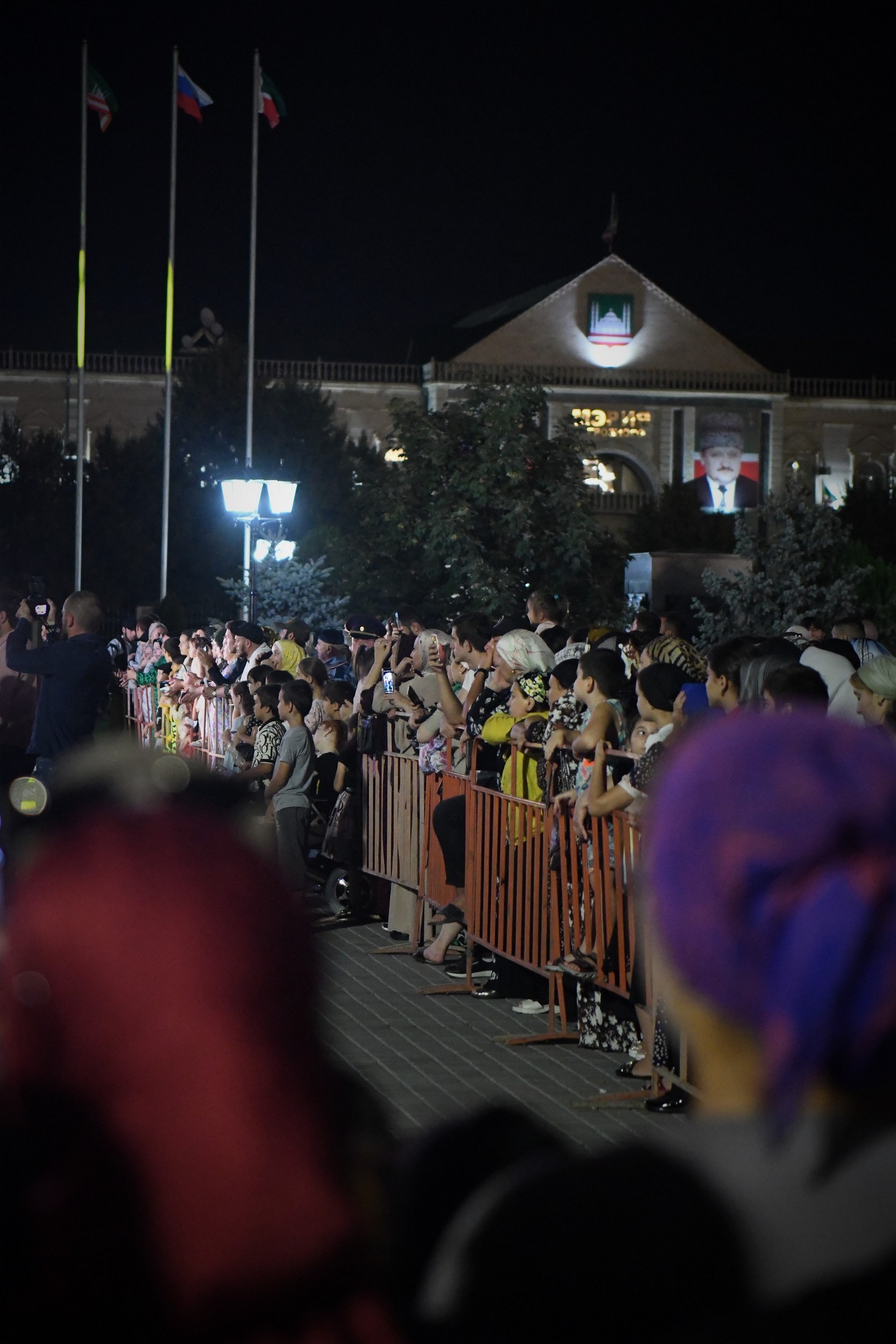
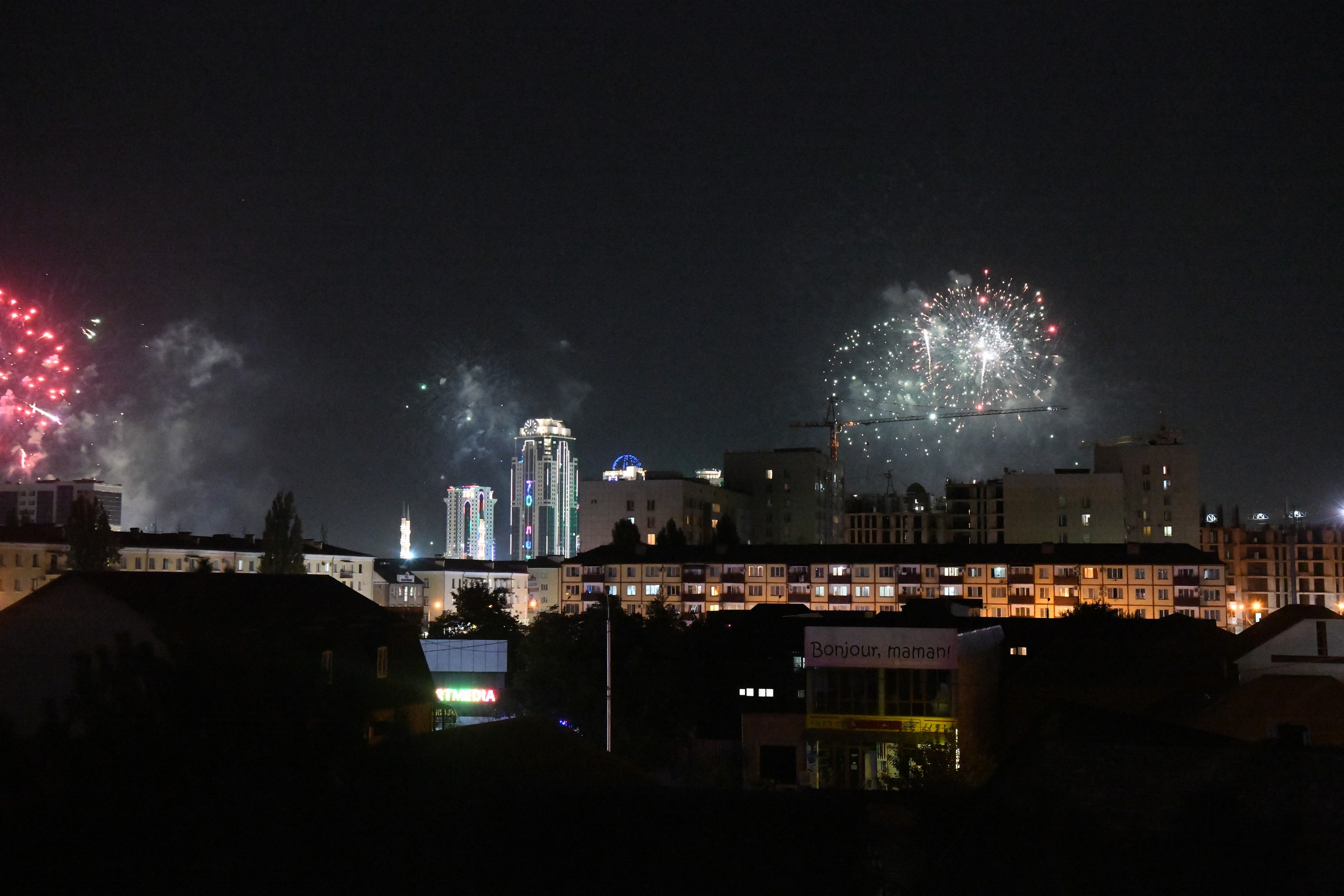
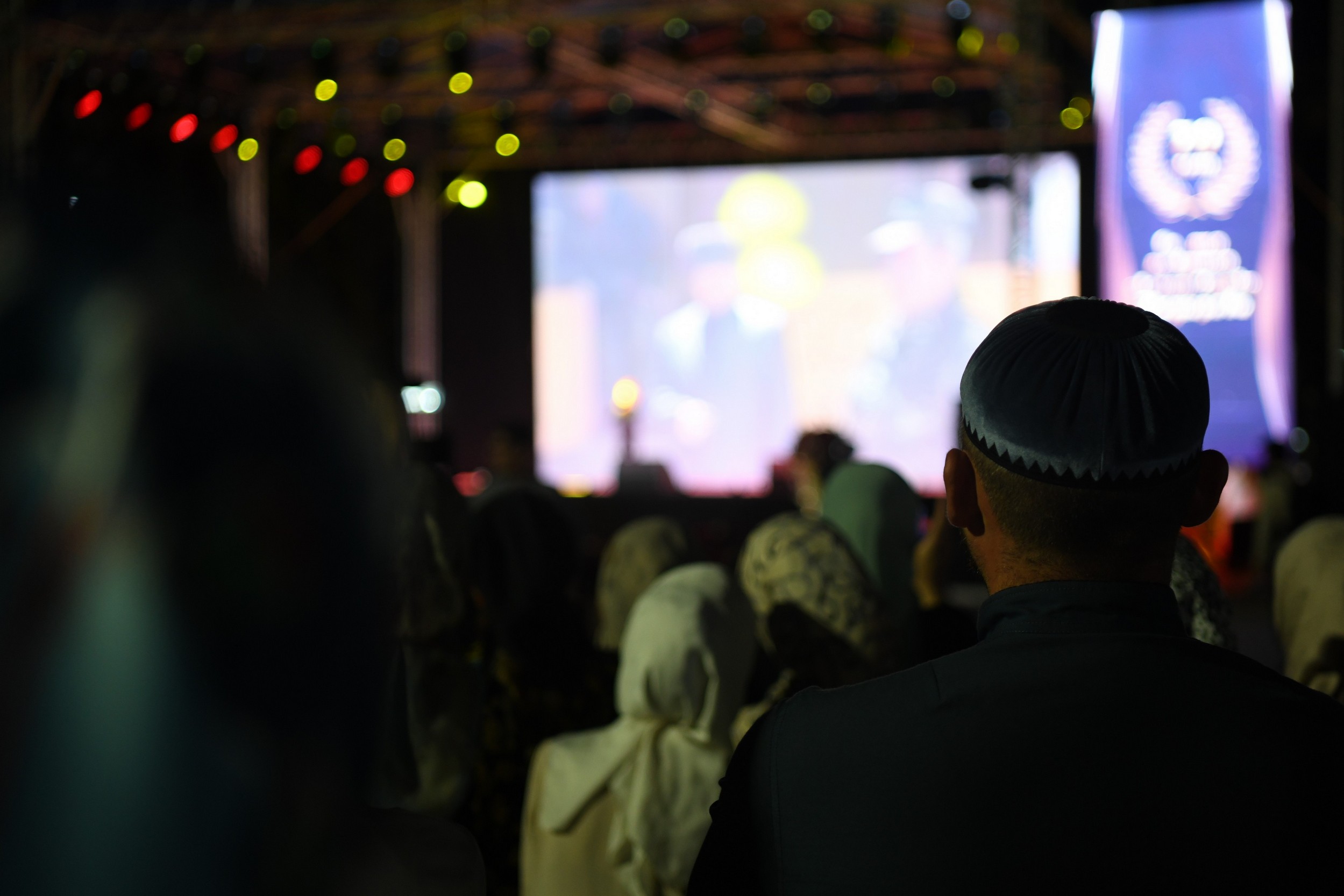
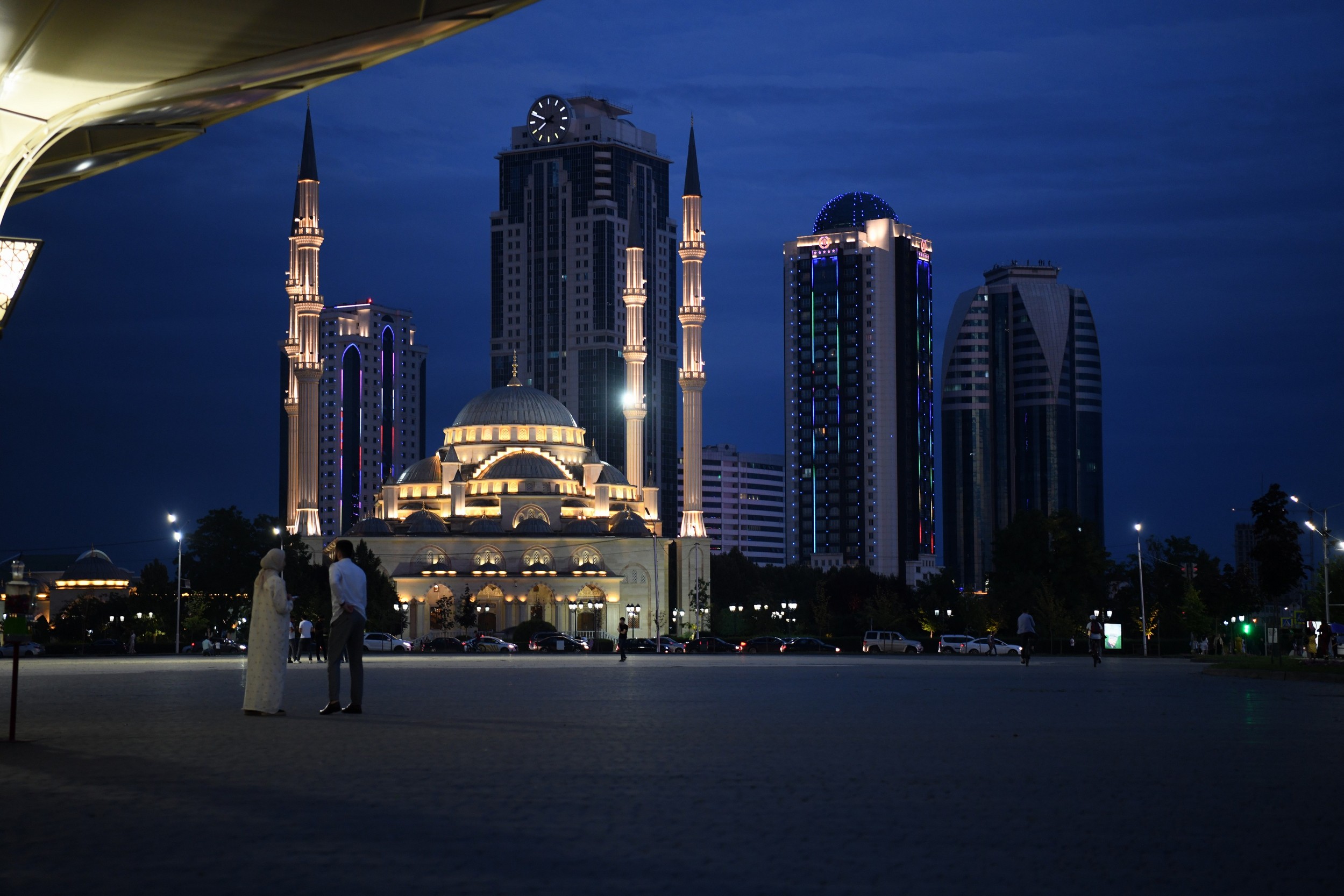
IV: puddles around 776-land
The thing when driving through Chechnya is, you can’t evade it. Leaving Grozny, driving through the countryside, you drive past graveyards with forests of poles tall up in the sky, poles with half moons stamped into the metal flag at their top. It’s as like they were saying: <hey, I’m still here>. They mark the graves of shaheeds.
You take a country road and drive past a former death factory, where people used to disappear. You take a country road and drive past Khattab’s camps, or what’s left of them – nothing but memories. You drive a mountain road through an ambush site remembering the grainy early-2000s footage blurring with every impact. You drive through a village and think of the rough voice of that Chechen bard singing his song of what happened there, now indexed. You talk to people and hear of the Chechen forest association. You talk to people and hear of a handful of heroes with avtomats stopping columns of Russian tanks.
But that’s a story we know. And that’s a story that dies down quickly.
чабан снимал папаху
я уже считаю
<Пусть меня не
V: ,you’ll get up with fleas.
The Chechens are a remarkable people.
I knew in advance but still, that’s what I will now not only know but remember as well.
I’ve never experienced a people to take you right into their middle, like a long lost son, a long lost pup. Caucasian hospitality, Adat, honour of the guest, yes. But the Chechens are special, they’re different. A people haunted by such an unimagable amount of painful memories. And thereby we’re not talking about some people but everyone, the people, every single Chechen. And also not only memories.
But nevertheless they have the kindness, trust and courage to embrace you, let you be part of their family, pack perhaps. And precisely for this reason my respect for them has only grown. Appreciate and have the willingness to understand their culture, their traditions, their history, their way of thinking, of living, listen, and they will appreciate you. Be sincere and you’ll get sincerity back. I’ve never met people as loyal. People as close,
as well. If you come home for summer from Paris, Kopenhagen or Moscow, it doesn’t matter. Speaking all the languages of the world, being networked all around the world, Noxchi are Noxchi. Young and old, strong and weak, moms, dads, brothers and sisters. This sticking-together is powerful. It is what keeps a people together, what leads the korabl (//ship) through the storm.
And while the ship might not as beautiful or as sturdy anymore as it seemed when leaving the port, some planks evidently having cracked on the journey, having bent apart, the cruiser does not seem to be on the way of sinking, not for now.
But like all the medals, also this one has a backside. While I’ve experienced the shiny one, this sticking-together probably comes with difficulties and challenges as well. Especially when living in another valley with a pack of wool instead of fur.
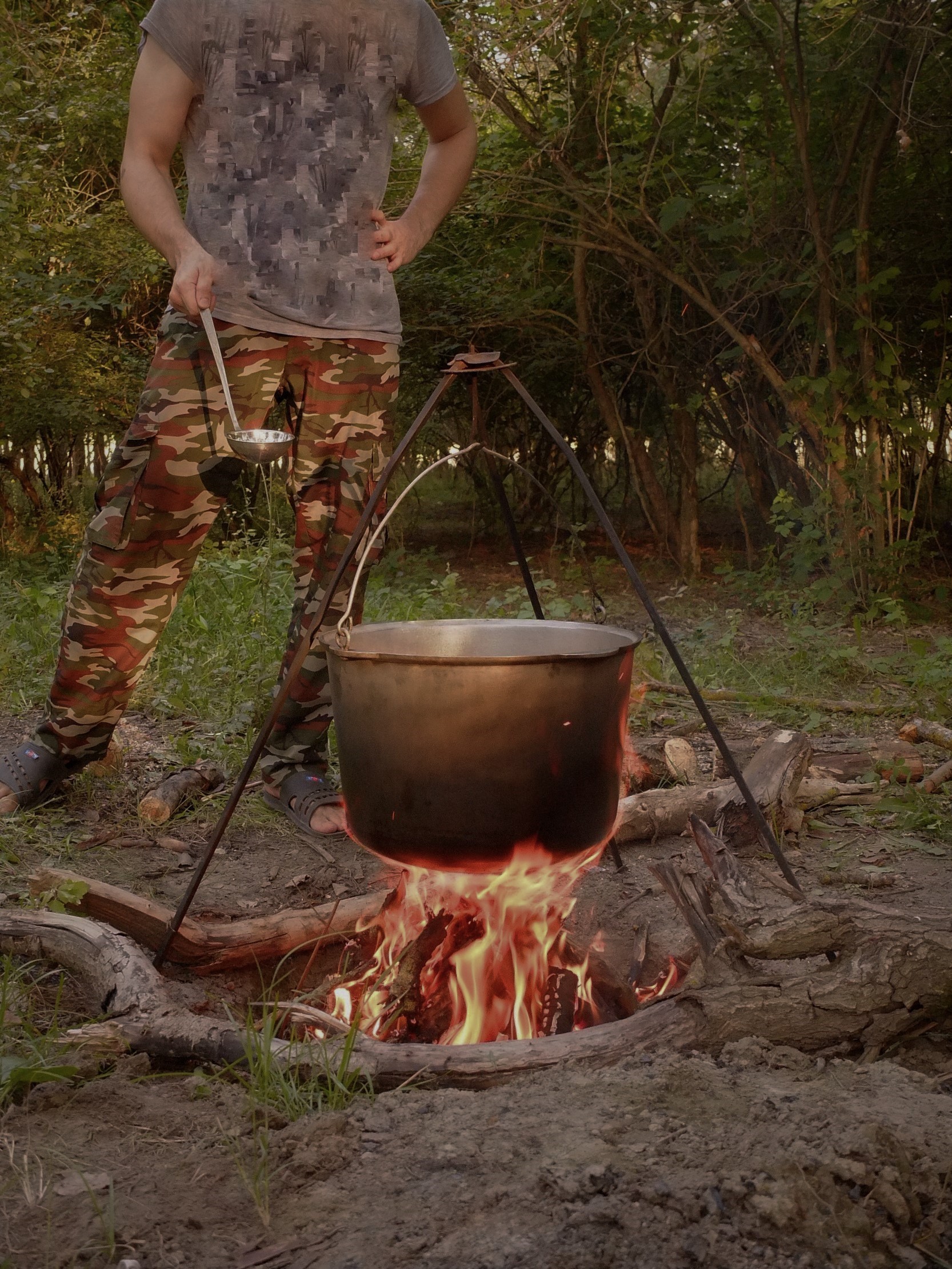
моисей? или б?
And while this may be a country with a broken pride, home to a people of broken hearts – the people that lives here, as I’ve learned, is not one of broken backs.
chat? get in touch.
